#john martin rare book room
Explore tagged Tumblr posts
Text
My DC Cinematic Universe - Creature Commandos: Part VI

Chapter Six:...Really, Weasel?
Long time no see, Tumblr! Been a minute, been busy since the new semester started, and I've got some time to get back into the swing of things. SO, without further ado...
Ah, Weasel. Now, here's a character I was never expecting to see adapted at all, nevertheless in LIVE ACTION of all things! So, before getting into the choice to use this character, let's talk about the episode that introduces his backstory in the DCU, Chasing Squirrels, AKA episode 4. Now, for the record, this is also a place where I COULD talk about the villains of the series, as this is where Circe's "plan" is fully revealed, but...nah. We'll wait until a later essay to fully litigate that mess. I have notes, I'll just say that.
But to get this out of the way, I actually like many of the changes to Weasel, and part of that is because I'm a sucker for the Tragic Clown trope. Y'know, the seeming comic relief or goofy character with an incredibly traumatic and horrid backstory? This is one of Gunn's favorite tropes, as Rocket Raccoon and Drax the Destroyer in the Guardians of the Galaxy films have this type of story. Weasel is no exception here, as Gunn clearly loves this character, and gave him what is arguably THE MOST fucked-up backstory of all of the Commandos, and that's saying something. And is that a necessary change? I mean...let's start with the comic book version before getting into some spoiler territory, and addressing the elephant in the room, or the, uh, Weasel in the basement.

First appearing in 1985's The Fury of Firestorm #35 (not pictured above, this is #38), John Monroe was best known as a Firestorm villain. But even more than that, he was the rare villain of Martin Stein, one half of the Firestorm Matrix, and the brains of the operation. Anyway, Monroe and Stein were students together, and eventually became professors at the same school. However, Monroe was a jackass, as well as a sociopath, and was heavily disliked. Even as a student, his peers referred to him as a "weasel".
When several alumni of his old university became fellow professors at his current university, he felt threatened in terms of his job security. So, in a completely rational response, he leaned into his former sobriquet super-hard, and fashioned a weasel costume. With it, he became the villainous Weasel, and began to murder his colleagues one-by-one. When Stein eventually came on staff, he became Weasel's next target. That's right. Weasel became a serial killer...for tenure. Also, side-note, they try REALLY hard to make Weasel scary, both with writing and with narration ("...he's deadly as a weasel", "Night of the Weasel", "for the Weasel, murder is personal"), but like...his name is the Weasel. Oh, and also, he's a dude in a fursuit. He isn't scary, he's just an asshole.

Once Firestorm defeated the insane professor, Monroe was sent to Belle Reve, where he was made a member of the Suicide Squad under Amanda Waller. In this run for the Suicide Squad, though, writer John Ostrander obviously never read the original Firestorm stories with the Weasel as a villain. Now, somehow, he'd completely devolved from being a physics professor who killed out of his own delusions and insecurity, into...well, a weasel-man. He speaks far more primitively, he's now a bloodthirsty murderer who only cares about meat and flesh, and maybe...an actual lycanthrope instead of a guy in a costume? Yeah, Ostrander DID NOT care about the original story, and it looks like DC editorial just gave him a character to use as cannon fodder.
And, yeah, I mean that, because after the group gets through most of their mission, Rick Flag, while corrupted by the helmet of the Thinker (just...don't ask), kills Weasel with a blast, and he'd stay dead. This is a character who wouldn't appear again until Blackest Night, as a zombie, and then would be reborn in the New 52...twice?

The first iteration of Weasel, John Monroe once again, is introduced in the...controversial universe-wide event, Forever Evil, during the New 52 era. In this event, supervillain take over the planet with the help of the Crime Syndicate from Earth-3. And Weasel...is there. I mean, look at the page above. Outside of a cameo appearance in the first issue of the storyline, he appears once in a spin-off story, only to die, uh...IMMEDIATELY. So, don't know his name, don't know if he's a guy or a weasel-guy, don't know anything. And every other appearance of the character from then on is either his ghost, or literally just James Gunn's version.
There actually was a second Weasel, introduced as a Batgirl villain. One of the original henchmen employed by the Joker, Daniel Weaver has there when the clown shot Barbara Gordon through the spine in The Killing Joke. He actually called 9-1-1 to alert the police of the event, making him somewhat sympathetic. Still a career criminal, he went to work for Evan Douglas, a corrupt cop in the GCPD known as the supervillain the Grotesque. In the process, he ended up betraying his employer again, and was killed one issue after being introduced. So, yeah, if you choose the name "Weasel" in the DC Universe, get ready to die pretty fast.
And maybe that's why Gunn chose Weasel. Speaking of...

Weasel Stomping Day
Gunn obviously chose Weasel for Creature Commandos because he had the character in The Suicide Squad. And, while the character certainly has some minor history with the group (literally one issue ever as a living character), it's definitely a choice. It's also obvious that Gunn also ignored the Firestorm issues, as this is clearly not a man in a weasel costume. It's possible that there'll be a tie when we actually learn Weasel's origin in the future, but we'll have to wait and see on that front. His name is John, of course, but that's short for John DOE, not John Monroe.
Now, the character became memorable in The Suicide Squad, of course, but he was treated entirely as a joke, down to getting his own funny-silly post-credits scene. In fact, they use that scene to confirm that The Suicide Squad and Creature Commandos DO take place in the same universe. Oh, and yes, I saw that interview where Gunn said not all of The Suicide Squad is necessarily canon, but I don't believe that for a second. Anyway, Weasel in the film is genuinely VERY funny, but isn't much else. Sean Gunn, of course, performs the character via motion capture as a crazy, gangly, kinda-gross weirdo, and it's SO effective, that Gunn used the popularity of the character to promote Creature Commandos. And there, he revealed the tragic truth. Remember that throwaway line about Weasel in the movie about the kids he killed? Well...

A quick personal note about me and my preferences: I hate tragedy for the sake of tragedy in storytelling. I find it a kind of lazy plot device to motivate a character purely through some grimdark shit that happened in the backstory. It works when used correctly and somewhat sparingly, but not constantly. And there are some forms of tragedy that are really shitty, and if you've ever read or seen badly-written stuff that features any woman ever, there's at least one trope that's terribly overused in fiction. Not gonna list it here to avoid triggering people unnecessarily. But, OK, is Weasel's tragedy worth including, and actually adding to the character's backstory?
Yes. At least, I think so. Look, Weasel's comic book origins are so shit, that the comics basically abandoned them after a single story. A serial killer murdering for tenure? Nah. An anthropoid weasel of as-to-yet undetermined origin who tried and failed to help a group of schoolchildren, only to be blamed for their murder with no way to defend himself? Now, that's...that's interesting. It's also especially interesting because it's not actually his origin story, it's just the reason why he's been convicted, despite the work of...Elizabeth Bates? Whoa, OK, that's the DEEPEST cut of deep cuts there. Elizabeth Bates, AKA Betty Bates, had her own comic book run in Quality Comics in the '40s. Ran for 10 years, over 61 issues, but she's been essentially banished to the completely forgotten pile for 75 years! So, OK, credit where credit is due, Gunn.

Anyway, back to Weasel. John's backstory here is very dramatic and well-told, going from a group of kids playing with their new weird animal friend, ET-style, to a...mildly comedic set-up where they accidentally set a basement on fire. Turns from comedy to tragedy INCREDIBLY quick, though, as these children all die, some with Weasel watching and attempting to save them. Watching him try to help, only to be shot and blamed for the event is genuinely very sad, and also creates an important distinction between member of the Creature Commandos and members of the Suicide Squad.
Monsters are born from tragedy, criminals are (at least in many cases) born from choice and circumstance. That's generalizing heavily in the latter case, but we're talking comic book characters, and I'm focusing on a wereweasel. Cut me a little slack here. Point is, something Creature Commandos does well is show the tragedy behind these characters. What it does somewhat poorly is justify their incarceration by Waller and Belle Reve. That's a Suicide Squad thing, not a CC thing. But with Weasel, that's done fairly well here.
At this point, of course, I've given enough praise to Gunn's portrayal of a seeming joke character, so we now need to ask the most important question: ...Weasel? Really? That's the character we're putting in the Creature Commandos? Or even the Suicide Squad? WEASEL?

Look, in case you haven't noticed, even DC doesn't care about this guy, AT ALL! He pops up every now and again, only to constantly die! And hell, he was turned from a dude in a suit into an actual weasel-man ACCIDENTALLY because the writers didn't care! I suppose it is nice that Gunn took and rehabilitated this lost and abandoned character, and I honestly am interested in seeing where he goes with it, but...Weasel? Surely there were other choices. The Suicide Squad can keep him, he makes a little more sense there. But he's mostly in Creature Commandos, it would seem, because of his appearance and popularity in that film. It's establishing another tie to that movie, making it even more a part of the DCU. And since that's expressly what we're trying to AVOID...let's reconsider.
Weasel is, obviously, meant to represent the werewolf character of the group. In DC, to be fair, there are very few interesting werewolves. They certainly exist, but none are really main characters that people remember today. But, as I've done previously, I'll present two choices for my iteration of the Creature Commandos, one by-the-books and one more creative. The only requirements here are that they are or once were human, with the ability to turn into an anthropoid mammalian carnivore, or having been made that way and being unable to turn back. Broad, I know, but the distinction is important. Their origin can remain shrouded, as it is with Weasel, but they need to have an origin that make them a lycanthrope canonically. And so, without further ado, let's get to my Weasel replacements.

The Purist Choice: Scratch (Zachary Griffith)
Gunn had the right instinct in terms of reinvention, so I propose another reinvention that folds in two separate characters, while also establishing tie to two separate versions of the Creature Commandos (and maybe hinting at a hidden past). So, may I present to you a completely forgotten character: Scratch. Yeah, uh, this is also kind of a nothing character, to the point where I gave him a last name. In the comics, he's just Zack. Zack is a teenaged werewolf, plain and simple. In the 5-issue comic book series in which he originates (and never leaves), he's a kid from the South with an unusual deformity: a large deformed finger. On his fifteenth birthday, it grows and the deformity spreads, only for it to fully blossom into what it really is: lycanthropy. Zack's a werewolf, plain and simple.
In his series, he befriends (and falls in love with, of course) a young woman named Sage with her own "deformity": periocular asymmetry, meaning that one eye is significantly higher than the other. That's the result of a nuclear blast that deformed many of the people of her town, Orangewood, especially the children. A little girl staying with her is kidnapped by a monster, the Ourobouros, and Scratch is the one to save her? But without revealing the ending to the story, the actual monster is prejudice. It's a whole thing, and an interesting read...but not hard to see why this is a forgotten story. I enjoyed it, but The Long Halloween it is not, even with the appearance of special guest (and kind of narrator), Batman. What all this means is, Scratch is a good candidate for a reboot and revitalization, but the story is a good basis for the flashback. As for the other character, and the origin of the new last name I've given Zack...

The way we're revitalizing Zack is by making him the great-grandson of Private Warren Griffith, AKA Wolfpack. Now, I'll get into how we're incorporating the original Creature Commandos, but make no mistake, ALL of them exited in my DCU. Griffith is also getting a little bit of a makeover, becoming an actual afflicted werewolf, rather than being transformed into an artificial werewolf. That may, we can incorporate this as a genetically-inherited condition, and have it get passed down to Zack. However, it'll skip a couple of generations, and his cousin, Wanda Griffith (oh, look, another comic book connection) will also have this condition, which will be a point for Zack to discover later on.
The events of Scratch will have occurred, but heavily altered. No Batman, and a lot more justice for the townsfolk at the end of the story, and making Griffith an actual killer, meaning that his inclusion in the team is...controversial, to say the least. In a real sense, he is monstrous, without being an actual monster. And his connection with Sage gives him some vulnerability, as does his role in protecting his community. Also, we're aging him up by a couple of years, so that his enlistment in the Commandos is done in order to get him back to Sage and their child, as-of-yet-unnamed, as well as the community they protect.
There's more development needed there, but this is a unique character that allows us to tie in the original Creature Commandos as well. However, I'd be lying if I said this would be a popular character, but...I mean, it's about as good as Weasel, let's be honest. Just depends on how he's portrayed. So, what about the creative choice?

Intermission: Therianthropy
So here's the thing: of all the therianthropes that Gunn had to choose from, especially the criminals...he chose Weasel? REALLY?!? There are a lot of characters that transform into animal form outside of wolves, which is why I made that distinction above, and Gunn chose the dude affiliated with weasels. I like mustelids, and I like weasels, I really do. But, like, even within Firestorm's rogues gallery, there's an ACTUAL therianthrope called Hyena, and they ALSO need a revamp in their backstory! Why Weasel and not Hyena?
But just to get to the short point here, there's a massive catalog of characters with beast-forms to choose from. Here's a somewhat messy list of them, and I'll narrow those down to some valid candidates here.
Anthony Lupus AKA Werewolf is, of course, an actual werewolf. But, he's another scientific and artificial werewolf over a supernatural one, and I'm actually aiming for either supernatural or genetic with this choice, so Anthony's out.
Apex Ava, Beast Boy, and the more recent Beast Girl are neat, but either require a bit too much explanation, or are characters that don't fit with the Creature Commandos, either because they're unrepentant criminals, or should be with other groups like the Doom Patrol.
Barbara Ann Minerva AKA Cheetah is a magically-transformed cheetah-woman, yes...but is WAY too high-profile for this team, not to mention too villainous. Sure, her morality is more flexible than some, but no, she's a bit too much for this group (even if I did use her as the image above). That's also gonna go for other therianthropic Cheetah, Sebastian Ballesteros, since that also requires some background information. Still, that one's lightly tempting, not gonna lie.
Boy oh boy, is Man-Bat AKA Kirk Langstrom incredibly tempting. And I'm not the only one who thinks so. Gunn himself wanted to throw Man-Bat into the team, because he's genuinely quite a good choice for the Creature Commandos. However, there are definitely a few reasons for excluding him in this team. For example...well, technically...wait. Shit.

The Creative Choice: Man-Bat (Kirk Langstrom)
OK, it's honestly hard to call this the "creative" choice, but goddamn if this doesn't feel like the right one. I tried, I promise you, I really tried to justify a choice better than this one. For a minute there, I was going for Samuel Register, the supervillain known as the Zookeeper, because he was a black slate character with ties to Beast Boy and potential ties to other characters, allowing the universe to be built out further. Plus, he had the ability to turn into other animals like Beast Boy can, thanks to self-experimentation, making him a versatile choice for a therianthrope team member. But, uh...that's basically just Man-Bat with extra steps, isn't it?
OK, introductions for the unaffiliated! Kirk Langstrom was a scientist with the goal of curing deafness by using experimental serum from bats, which use echolocation and have excellent hearing. Going deaf himself, he tested the serum he developed on himself, like you do if you're a comic book mad scientist. In the process, he became a werewolf-like humanoid bat creature, uncontrolled and rampaging as an enemy of Batman off-and-on. He's a typical tortured soul, trying to cure himself and battling with his animalistic urges. In other words, he's a werebat, without the lunar cycle issues in your classic werewolves. Alternatively, he's a Jekyll-and-Hyde character, but his Hyde can fly and occasionally drinks blood (depending on the incarnation). Either way, he's a seminal Batman villain/ally, and quite literally the first villain used by Batman: The Animated Series.

I love Man-Bat, and he's an excellent choice for the Creature Commandos, for multiple reasons. Not only does he fulfill the werewolf role, but he also fulfills the role of the vampire if you choose to use that iteration of the character. Not only that, but if you want to go with Gunn's tragic backstory route, this is an easy character to do that with. Hell, look no further than the version of the character in Batman: Arkham Knight for an excellent tragic Langstrom. Bringing in his wife, Francine, is a pretty solid way to do this. And...actually, that's basically exactly what Gunn did with Doctor Phosphorus. Tragic doctor, transformed into a monster as a result of work that was supposed to be beneficial, becomes a villain of Batman after said tragedy. Yeah, Langstrom here is basically Weasel and Phosphorus combined, so...why didn't Gunn use this guy? No, really, why not?
Well, uh, according to Gunn...it's because he wanted to use Weasel. Yeah. Surprise.

Gunn stated, and I quote:
I definitely considered Wolfpack, and, especially, Man-Bat (one of my faves). But I knew I wanted to tell Weasel’s story so it felt like too many rabid and fuzzy characters.
And that's fair, honestly, but given Weasel vs. Kirk Langstrom (or Phosphorus vs. Langstrom, actually), I choose Langstrom literally every time. Not only is he a prominent fan-favorite character that could really help establish the Batman corner of the DCU (like Phosphorus did), but he's also a scientist who can establish ties with a bunch of other characters; he's a guy that could easily get a spin-off special or miniseries all on his own; and maybe most importantly, he's not necessarily a villain. He's an incredibly complex character with his own agency and life, and would be an asset for the Creature Commandos as a team. And honestly, I don't even think he should be a second season character; bring him in for the first, then spin him off. The potential here is crazy, and it's a shame it was unexplored.
So, how would I run Langstrom if I had my Creature Commandos series? I mean, essentially as I said, with a few modifications. For instance, the whole "fix deafness" thing is and always has been terribly ill-informed and kinda dumb from a scientific standpoint. So, what if there's another bat-related trait that can be useful for Langstrom's purposes? For example...their absolutely insane immunities. Bats are both viral reservoirs and nearly cancer-proof, meaning that integrating elements of their genome into the human genome would be, honestly, quite valuable if it were possible. And this is a comic book universe, so...why not?

I'd love to explain my idea for Man-Bat fully, but...this post is getting long. So, I'll just throw in a short list of the characters I would involve with his story. Emile Dorian, Abel Cuvier, Achilles Milo, Anthony Lupus, Mark Logan, Samuel Register, Katherine Viverrida, Samuel March, Francine Langstrom, Aaron Langstrom, Warren Lawford, Armand Lydecker, Gunther Hardwicke, and Batman. And honestly, I'm pretty sure I'm low-balling it. If anybody is interested in hearing my full ideas for the character, let me know (maybe I'll make another post about it). However, like I said, this post is getting pretty long already.
Let's just say that Kirk will come to the Creature Commandos looking for redemption, seeing himself as a monster (rightfully so, based on his backstory I have plotted out in my head), and requisitioned by the government with this goal in mind. He'll struggle to release his chiropteran other-half, and when he does, it's an additional struggle to subdue it with the help of medication. When the Man-Bat is released, though, it is incredibly valuable and somewhat uncontrollable, but also DEFINITELY scary enough to work for the team as intended. By the end of the series, the two halves will become closer to being whole, and experimental treatments will give Kirk limited control when in Man-Bat form. Limited control. That's the sort of thing to come in a spin-off, or in a second season if Kirk isn't popular enough.
And with that, we close this chapter, for now. Lemme know if you're interested in any further ideas about Man-Bat that I may have. Next time, we move on to...oh, right. This one's gonna be an overhaul, which is controversial because this was a REALLY popular character. But yeah...let's talk Doctor Phosphorus.

See you next time (maybe, no pressure)!
Part One: Introduction and Adaptation Part Two: The Original Creature Commandos Part Three: Amanda Waller and Rick Flag, Sr. Part Four: The Frankensteins Part Five: G.I. Robot Part Six: Weasel Part Seven: Doctor Phosphorus
#dc#dc comics#dcu#dc universe#dccu#my dcu#my dccu#creature commandos#weasel#john monroe#suicide squad#the suicide squad#weasel dc#weasel creature commandos#man bat#man-bat#kirk langstrom#wolfpack#warren griffith#scratch#james gunn#firestorm#martin stein#ronnie raymond#batman#werewolf#therianthropy
4 notes
·
View notes
Note
Tim provided his statement to Martin and not the Archivist and used the same grammar and tone that people typically use when speaking to John. Maybe it's a tiny plot hole, like why Georgie is able to be compelled by John even though she's incapable of feeling fear, but maybe you have a point
I ... don't feel like that's a plot hole, though? At least, it's not inconsistent with the way I think it works.
For one thing, the process of drawing out a story is more about presence and intent than it is about the Archivist looming over someone and turning on the static. For another, as you say, Tim's talking to Martin and the Martin situation is complicated.
For a not insignificant portion of Gertrude's tenure, people mostly sat in a room by themselves and wrote out the statements. They even reference it, sometimes.
John/"Antonio Blake" But I recognise you. As I write these words I can see you in the other room, eyes locked on whatever book you’re diverting yourself with; I recognise you from my dreams. They said at the front desk that you review all the written statements, so I can only hope that you take the time to read through this one fully. – The Magnus Archives: Dreamer
But that works too: it produces the same fluid, descriptive style that you get from the spoken statements. Everyone who walks into The Magnus Institute immediately transforms into a capable writer of late 19th to early 20th century style ghost stories.
The Doylist explanation for that is that the creator enjoys that style. The Watsonian explanation is that the presence of the Archivist produces it.
While I Guess You Had to Be There is mostly played for humour, there are more serious examples of how this works.
Martin/Adelard Dekker I do envy you your gifts sometimes, Gertrude. His account of their pursuit through the mirror-maze was honestly so disjoint that I was unable to follow it. Even after he tried to take me through it two, or even three times. Without the Eye’s clarifying influence, panic can make details… difficult to remember. – The Magnus Archives: Reflection
Dekker is intelligent and knowledgeable, and dealing with a willing interview subject. But none of that allows him to draw a coherent description from a guy who is just too terrified to be a reliable witness. Get Gertrude to stand next to him while he does this and the problem goes away.
The Archivist doesn't actually have to take the statement, but something about their presence or influence greases the wheels.
Sneak Preview takes place during one of those rare moments in season three when they actually know where John is. He's in China, sure, but he's in contact and not kidnapped right this second. Things go off the rails for the assistants specifically when he has been taken, and is under the power of other avatars.
And yeah – it's Martin. Martin spends a lot of the story inhabiting a weird grey area between Archivist and not-Archivist. The question of whether someone is an avatar or not is clearly more than a simple binary. There's a process here. John is "the Archivist" from day one, but he can't do most of the stuff he can by season four at that point.
Everyone who reads statements does that thing where they lapse into a kind of trance and take on the persona of the storyteller. It happens with Melanie and Basira too. But only Martin consistently reads the statements, and reads them explicitly with the intent of "filling in" for John. He takes other statements in person too, intentionally and otherwise – the unnamed woman in Scrutiny, Simon Fairchild in Big Picture, and Simon calls out the fact that Martin has the same ability to draw out a tale.
Simon No wonder I’m so sympathetic to the Lonely! You know, this really is a place for self-discovery, isn’t it? (chuckles) Statement ends, I suppose. Martin Er – I’m sorry? Simon Oh, nothing, just my own hubris. I should have known. When I came here, I said to myself, “Simon,” I said, “You’re going to answer this young man’s questions, but you’re not going to give the Watcher a statement. You’re better than that.” But it’s a hard one to resist, isn’t it? You get in the flow of talking about yourself, and it all just… tumbles out! – The Magnus Archives: Big Picture
Obviously the path Martin walks is not the same as John's, but one of the prerequisites of that path was that he be a little bit Archivist.
And in Sneak Preview, Martin is very much encouraging Tim to tell his story to John.
Martin Please, Tim. Tim No. Martin He needs to hear it. Tim I don’t care. Martin He can’t help if he doesn’t know. Tim I don’t want his help, Martin. – The Magnus Archives: Sneak Preview
So yeah – Tim is very much telling his story to the Archivist. It's just that it's better if he doesn't do that when said Archivist is physically present, in order to avoid unnecessary bouts of fisticuffs in the break room. And Martin is deliberately acting as John's proxy here, a role that he also grows into over time.
There's a lot of stuff going on with the tech in The Magnus Protocol, to the point where I'm reasonably convinced that "network protocols" is an important interpretation of the name.
The Magnus Archives dealt largely with stories that had been written down with pen and paper, and it was a significant plot point that they actually couldn't use anything more advanced than a tape recorder. The laptop failed to produce useful recordings.
In The Magnus Protocol everything is online, either because it was created as such originally, or because Freddy has packaged it up and delivered it to the OIAR. It's the tech that produces the stories and thus I would contend that it is also the tech that produces the style of those stories.
The characters talk like that because their apps, their phones, that bloody tape recorder, produce the same effect as the presence of the Archivist.
7 notes
·
View notes
Text

Music documentaries are hardly a rare occurrence these days, particularly when focused on The Beatles. Over the years, the Fab Four have been at the centre of countless different documentaries, books, and films, all aiming to give a little more insight into the life and times of the biggest band of all time.
However, it is not often that these films feature such a star-studded production crew, including the likes of Martin Scorsese and David Tedeschi, who are set to collaborate on the upcoming Disney+ documentary Beatles ‘64.
Focusing on The Beatles’ first visit to the United States back in 1964, the documentary film aims to capture the spirit of a particularly important period in the band’s history. By the time they visited the USA, John, Paul, George, and Ringo were already household names in their native United Kingdom, but the intense popularity they witnessed in the States set the band on a path to global domination. Not only did their trip to America represent the absolute pinnacle of Beatlemania, but it ushered in an entirely new era for the group.
Beatles ‘64 will aim to capture the unparalleled cultural moment of The Beatles touching down at JFK Airport in New York, before appearing in living rooms nationwide through their performance on The Ed Sullivan Show. The importance of this event within the history of American music cannot be overstated, a fact which Beatles ‘64 will explore in-depth.
The documentary will reportedly be compiled of archival clips and famous footage of the band, in addition to footage originally shot by documentarians Albert and David Maysles, newly remastered in 4K. What’s more, the iconic film of The Beatles performing on The Ed Sullivan Show have been extensively remastered, too. This mixture of new and recently remastered footage will likely make Beatles ‘64 essential viewing for fans of the band.
3 notes
·
View notes
Text
book ask
what is the best book you have ever read? Hardboiled Wonderland and the End of the World by Haruki Murakami
what is the worst book you have ever read? the bible
what is your preferred genre? mystery/thriller
what is your least favorite genre? true crime (I hate it)
what book do you think everyone should read? Fahrenheit 451
do you track the books you read? if so, how? nope
how many physical books do you own? too many, my exes have stolen some
how many digital books do you own? too many on audible and I don't pay for it anymore
do you have a favorite author? Tamora Pierce for YA and Caitlin Starling now
what book are you reading right now? Sugar People by Oliver Ferrie @oliverferrie
what book do you want to read but haven’t? Manhunt by Gretchen Felker-Martin
which book will you read next? The Last to Leave the Room by Caitlin Starling
what was the last book you read? The Final Girl Support Group by Grady Hendrix
how many books do you read in a year? 2-3
have you been/are you in a book club? no
do you write in the margins of your books? yes
do you highlight in your books? yes
do you have any rules if you loan someone a book? give it back
do you fold the pages or use a bookmark? fold
what is your go-to bookmark? receipt for book
do you prefer to read or listen? either or depending
would you want your favorite book to be a movie? depends on which book and who directs it
what book to movie adaptation do you love? Hamlet (2000) starring Ethan Hawke (Maya Hawke's dad)
what book to movie adaptation to you dislike? Hamlet Unabridged by Kenneth Branagh
do you frequent your local library? no
do you use libby? (or other) no
is there a book that scared you? several RL Stein books
is there a book that made you cry? Hardboiled Wonderland and the End of the World
is there a book that made you laugh out loud? The Final Girl Support Group
is there a book that changed your life? WoW's book about some OC druid
how many books are on your current tbr? 3
what is the first book you remember reading? Harold and the Purple Crayon
what was your favorite childhood book? The Pale Green Pants (With Nobody Inside Them) by Dr Seuss
do you read more than one book at a time? no yes
what’s a book you read over and over? Grendel by John Gardner
what’s the most you’ve reread a book? 4 times
do you always finish a book even if it’s bad? no
have you ever met an author in real life? yes we're friends
favorite quote from your favorite book?
do you own any “rare” or “collector” books? no
do you prefer paperback or hardback? paper
do you buy new or secondhand books? either
do you donate books when you are finished or keep them to come back to later? keep
did you read more as a child or now? less now
thoughts on separating the author from the work? depends on context
share a pic of your bookshelf! no thank you
what book do you feel most connected to? The Death of Jane Lawrence by Caitlin Starling
what book would you give someone if they wanted a glimpse into your psyche? Grendel by John Gardner
do you still subscribe to or read magazines? no
do you subscribe to a newspaper? no
0 notes
Text
Thank you, this covers several other things that I thought about that information! I was thinking about that page from the Daily Show book (a page I only know about because you took that picture and shared it some time ago) - the page that confirms that it is true that Ricky Gervais was involved in getting John Oliver the Daily Show job, though if I were John, these days I'd be backing Demetri Martin's claim that it was actually him who got John the job, even if there's no truth in it.
That page was the first time I learned that Andy Zaltzman was on The Daily's Show's radar at all, but as you say, there's nothing in that book that says Andy actually auditioned as well. I'd just been assuming they went to watch Zaltzman and Oliver perform as a double act, and of the two of them, John was the guy whom they decided to call in for an interview. Probably because... I know John Oliver isn't the most Hollywood-style/conventionally handsome man in the world, but he looks more telegenic than Zaltzman. Also, John Oliver's humour does tend to be a bit more grounded and accessible, while Zaltzman's the one doing the wildly convoluted flights of bullshit fancy. So I can see how TV people who watched them both perform would decide that John's the guy they want.
But the information that they both auditioned is new. I'm now seeing this through my lens as someone who was in highly competitive sport for many years - because I've already made it clear that I find it nearly impossible to describe the Zaltzman/Oliver dynamic without descending into sports metaphors. And it's because so much about how they work together reminds me of what I've seen from the very best teammates/training partners in sport, ones who bring out the best in each other and push each other to become better athletes. Ones who know each other's styles so well that each style have to evolve and adapt in order to respond to the other, their matches with each other reach deeper levels of the sport than anything else, just because they've learned how to get past each other's basic responses and they both end up finding new ideas.
In all my years as a competitive athlete and then as a coach to competitive athletes, one thing I learned is that when you have two teammates/training partners in a relationship like that, the worst thing that can happen is they get pitted against each other in a competitive situation. You want those people tearing each other to pieces in the practice room, but in a tournament, competing in different divisions so they can cheer each other on. If one beats the other when it actually matters, the friendship rarely survives, and the training relationship takes a big hit. They stop being able to work well together in practice, because they're trying to hurt each other instead of improve each other. And even if they try to go on as they did before, the bitterness comes out and messes with it.
...I am aware that Andy Zaltzman and John Oliver are not competitive athletes. But relationships like the ones I've just described are so common, and as a coach, trying to preserve relationships like that, even in the face of competition, is a big part of my job. Which may be part of why I find comedy dynamics like those described in article from the beginning of this post so interesting, the double act where both people make each other more than the sum of their parts, until it all implodes.
Point being, I already knew that the fact that the Zaltzman and Oliver working relationship lasted for so long despite the massive fame disparity means Andy Zaltzman is a saint who's largely resistant to the natural human bitterness response (not 100% immune to it, as evidenced when John Oliver finally left The Bugle, but Andy's good humour held on for a long time before that). But if they both auditioned together for a life-changing opportunity, and only of them got a callback? By rights, that working relationship should have imploded in 2006.
I realize that reading all this stuff into the situation between two people I've never met is incredibly parasocial of me, by the way. I don't have a good justification or mitigation for it, or anything. I just want to acknowledge that I know. Sorry. I would try to avoid getting too parasocial about Chocolate Milk Gang-era Zaltzman and Oliver, but I think that ship's sailed long ago, I'm leaning into it now.
Anyway, @lastweeksshirttonight, I also want to know whether they were auditioning to be the first double act on The Daily Show, or whether they knew they were both competing for a single spot. What a shame that I didn't come across this article until after it was too late to submit questions for the Zaltzman/Oliver 2024 Bulge Q&A. Which is coming out this weekend, and I'm sure we'll all be a normal and non-parasocial amount of excited about it.
I just came across the article today, and the whole thing is very interesting. I highly recommend reading it all, to anyone who's interested in the history of British comedy double acts. It's basic stories that I did already know - Cook and Moore, Lee and Herring, Newman and Baddiel, French and Saunders - but it juxtaposes them in a way that I quite enjoyed reading, and adds a number of details that I did not already know. I am interesting in double act dynamics, so this was a really cool article.
However, I am, of course, going to cut and paste on particular segment:
In 2006, Andy Zaltzman and John Oliver, who were at the time writing their third Edinburgh show together, travelled to London to audition for a role on Jon Stewart’s The Daily Show. Only Oliver, however, was called to a second audition. “When they offered him the job, unfathomably, John chose to go and work on the world’s leading satirical TV show rather than speak to 30 people in a tiny room in Edinburgh,” Zaltzman tells me over a Diet Pepsi in a London pub. After the swift departure of Oliver, who now presents HBO’s primetime political talkshow Last Week Tonight, Zaltzman was left to write and, two weeks later, perform the Edinburgh show alone. “It was difficult because I had nothing to replace this wonderful working relationship and friendship,” Zaltzman says. The year after Oliver left for America, Zaltzman “bumbled along” performing political standup. Then they were offered the opportunity to record a weekly topical podcast, the Bugle. Oliver agreed to rejoin the double act (albeit via a telephone line) as co-host. “It worked well straight away,” says Zaltzman. “There hadn’t been any great falling out, so in that sense it was easy for us to work together again.” The podcast, a satirical take on the week’s news, ran from 2007 to 2014 without a break. It then had a hiatus while Oliver focused on launching his new TV show; he soon found that the show was taking up too much of his time, and the Bugle came to an end in 2015. Then in 2016, Zaltzman relaunched it without Oliver, instead partnering with a roster of comedians including Nish Kumar and Hari Kondabolu. “To lose [Oliver] after having worked so closely for years left a void,” says Zaltzman. “But my frustration was not with his success. I like to think I haven’t become a bitter, twisted, resentment-fuelled showbiz cliche. But maybe there is a residual awkwardness about the different paths we’ve taken.”
Sorry, what the fuck? Did anyone else know about this? That apparently Andy Zaltzman also auditioned for The Daily Show, at the same time as John? I know a hell of a lot about the Zaltzman and Oliver history, and I never knew that. Which means Zaltzman's kept it quiet, in the all the times he's told stories in interviews about the paths their double acts took in those years.
I'd heard all that other stuff before. There's a Bugle quote (from 2018, the same year this article came out, so I guess Andy was into that phrasing at the time), in which Andy refers to: "June 2006, when [John Oliver] told me he wanted to do the Daily Show job instead of coming with me to Edinburgh to talk to 25 people a day in a darkened room." And of course I've heard Andy talk about how he felt like he was "bumbling" in the year between John going to America (June 2006) and The Bugle starting (Oct 2007), as he tried to get by without the double act. I'm convinced that the difficulty he had during that year is why he waited so long to pull the plug on The Bugle in 2015, when John had clearly checked out, and yet Andy kept doing filler episodes in which he'd tell us they're going to get this going with John again soon, like a mother telling the children that their dad has just gone out for cigarettes and will be back. Of all the double act stories in that article, Zaltzman and Oliver has to be one where one member tried the hardest to claw on after the other was out, not wanting to let go of it. And I include Lee and Herring, when I say Zaltzman and Oliver did that more than any others.
Anyway, the information that Andy Zaltzman had also auditioned for The Daily Show is a massive fact for this article to just casually drop. That recontextualizes a lot of stuff from around that time, and makes a lot of sense. @lastweeksshirttonight, @bimwi - as the other people here who know a lot about that history, am I the only one who didn't know that? Was anyone else aware of this?
24 notes
·
View notes
Text
The Critique of Manners, Part II
~Or~
A Candid Review of ITV's Emma (1997)
Disclaimer: I do know that both this and the Miramax version were released in 1996, but to avoid confusion, I refer to this one as the “1997 Emma” in reference to the US release date.
The bones of this review were written some six years ago after my initial viewing. I’ve watched it three or four times since then, two very recently (Within the past year). I’d started to soften on it in the most recent watch. So many people love it so much I thought surely maybe I’m just crazy or even wrong; until I found this blog post from 2008 (a year before my favorite version was released) that hit on almost EVERY SINGLE thing that skeeved me out about this version when I first watched it.
Like my previous review of Emma. (2020), I’ll be covering the cast and overall handling of the script in comparison with what I know from reading the book. I will also be commenting on my thoughts about the costumes (Whether they are attractive or accurate, or both, or neither) which will be a bit more in depth than it was for the 2020 version, and this will set a pattern for the costumes section going forward.
Directed by Diarmuid Lawrence with screenwriting by Andrew Davies (Or should I say “Written by Andrew Davies with direction by Diarmuid Lawrence”?), this version was a fan-favorite among Janeites for many years for … well, reasons I’ve never been entirely certain of. I’ve read the book twice through and referenced pertinent passages MANY times besides, and really I don’t see what they’re raving about.
Let’s dive in.
Cast & Characterization
I’d known about this adaptation for a while, but I held off on watching it, largely for one reason: my apprehension about Mark Strong playing Mr. Knightley.
I was concerned because when I watched this I had already seen Mark Strong as Sir John Conroy in The Young Victoria and as Lord Blackwood in Sherlock Holmes, both very unpleasant characters. But there have been several occasions when I expressed displeasure with casting choices only to eat my words when I actually watched the movie. So I entered into watching this with an optimistic outlook, sure that Mark and Kate would surprise me with brilliant performances. And I would like to say that they did, but that would be an untruth.
My biggest fear about Mark Strong playing Mr. Knightley was that his rebuking of Emma was going to be a watered down version of ‘RAAAWWWRRR’ that I was familiar with, specifically because of The Young Victoria. It’s very hard for me to see Mark Strong point his finger in Emily Blunt’s face and shout at her, and then watch him do the same thing with Kate Beckinsale (only somewhat less aggressively) and expect to feel all warm and fuzzy about their romance. I expected that to be a tall order. And it was. Whenever he raises his voice, the right side of his face pulls up into a snarl. Now since it does this no matter what role he’s playing I’m guessing that’s just how his face is. It’s not his fault really and it’s almost certainly unintentional, but I’ve seen that snarl before and it does NOT belong on Mr. Knightley’s face.
Don’t ever think I don’t LOVE Kate Beckinsale, and I don’t necessarily think that my problems with this interpretation of Emma are her fault; these things very rarely fall on the shoulders of the actual actors, but those of the screenwriters and directors who guide them. However – and I am aware that this might sound a bit harsh – I would say that at points, Kate Beckinsale’s performance in this movie (In my opinion) barely outstrips community theatre or even very good high school drama club level acting. It seems to me that there’s burden on her here to sound historical or period. This lends to this interpretation of Emma feeling at once both cold and childish (more on that later.)
Her best moments are when she runs into Jane as Jane is leaving Donwell and when she speaks with Robert Martin at the end of the film. I always like scenes where Emma tacitly apologizes to Mr. Martin, and her feeling when she invites him to Donwell is Kate’s finest moment in this movie.
I found Raymond Coulthard’s Frank Churchill insignificant at first, but on repeat viewings I really started to hate him. I don’t think Austen intended Frank’s caddishness (to use more modern vernacular I’d say he’s an utter “Douche”) to be quite this obvious on first glance. He’s a creep in this version and Raymond Coulthard is just not at all attractive to me, from his big nose to his little shark teeth.
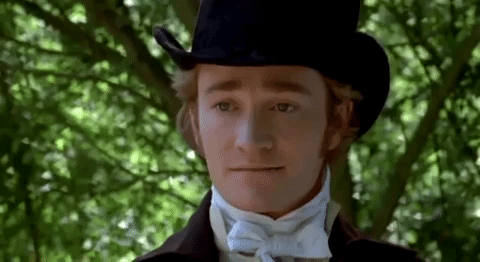
Olivia Williams was a good, even great, Jane Fairfax, and in my opinion does a much better job of portraying Jane’s vexation than, say, Polly Walker did (more on that next time), while still quietly looking like she’d like to arm-bar Frank rather than take his vulgar teasing lying down.
She also has the distinction of being the only Jane Fairfax who’s singing REALLY blows Emma’s out of the water, and I like that all of the songs she sings are in languages other than English (primarily Italian I think?). This achieves the double whammy of showing how much more accomplished she is than Emma by emphasizing that not only does Jane sing and play better, but she knows languages too.
Samantha Morton is a superb actress whom I love and I was sort of appalled at how she looks in this movie. Is she dying of a wasting illness? She looks like a gust of wind will carry her away, although since she looked the same in the 1997 Jane Eyre (In which she played the title role under similarly appalling direction) perhaps that was just her look that year?
Dominic Rowan, as Mr. Elton, is… there’s a perfect word to describe it and I just can’t think of it right now. Like every other young man in this movie (other than Robert Martin) he’s got this feeling of skeeviness to me but it’s more than that. It’s a dweebie-ness as well. This is so dissatisfactory to me because Mr. Elton is supposed to have every appearance of charm and agreeableness, with his only obvious fault being his over-eagerness to ingratiate himself to Emma and some rather vulgar locker-room type talk about marrying for fortune. He’s just so… (I’ve hit upon it now after some discussion with my sister) dingy. He looks less like a “very handsome young man” who “knows the value of a good income” and more like the kind of guy that scrubs up okay, but still you can tell from the rumple of his clothes and the pizzaroni odor wafting from him that he lives in his mom’s basement.
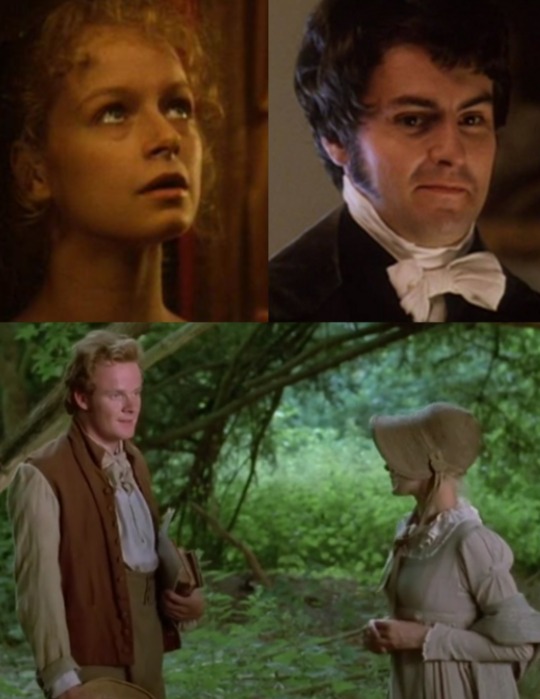
The shining star for me in this production was Alistair Petrie as Robert Martin. I love him as an actor and especially after watching him in Cranford, I think he was an excellent choice for Harriet’s Mr. Martin.
Davies wrote the character to be a little more romantic (Actually buying Anne Radcliffe’s The Romance of the Forest, where originally Mr. Martin was supposed to forget to – something Emma uses as a mark against him to prove how he will age into an “gross vulgar old farmer” who is “obsessed with profit and loss”.)
I especially like an inserted scene where Mr. Martin, working in his field, sees a distressed Jane Fairfax from afar as she is walking home (I think from Donwell). I thought it drew an interesting parallel between two emotionally wronged characters that otherwise would have no interaction.
What’s with Mrs. Elton (Lucy Robinson)? I don’t think nearly enough people question this. I’ve seen it explained away as her being from Bristol and trying to make herself sound more hoity-toity to hide the fact that she’s New Money. I’m not positive on what a Bristol accent sounds like (For that is where Augusta Hawkins is from) but… this sounds like an American trying to sound posh. At some points she almost sounds Texan. It’s all very confusing, because the actress is British.
Prunella Scales lists among her achievements being an outstanding actress and comedienne, as well as bringing into the world Samuel West, one of my all time favourite British screen crushes. She's probably best known for her work on Fawlty Towers, so its interesting to see her range as much less inscrutable Miss Bates. Her performance is by the book, but so much more engaging than Constance Chapman's 1972 offering, although i find her perhaps a shade too placid. She lacks a certain nervousness that I associate with the character (for more information, see my previous review.)
As for Bernard Hepton as Mr. Woodhouse, I can only say I. Didn’t. Like. Him. I have every consciousness of this being a personal bias. I have seen him play too many insufferable characters in too many things to like him as Emma’s lovable if tiresome father. This isn’t a knock on him or his performance; his reaction to Mrs. Elton is some great subtle visual comedy, this is just a me thing.
Another one of the better characterizations, though a relatively small role, is John Knightley. Played by Guy Henry, he is shown to be a good father, and an “Gentleman-like man”, with just the right blend of good humor and caustic comments.
Sets & Surroundings
I’d never paid MUCH attention to or questioned the houses and interiors used for estates in Austen adaptations until the 2020 version of Emma used such ridiculously lavish houses for relatively provincial gentry it forced me to sit up and pay attention. I think the houses used in this version are mostly suitable.
The part of Donwell Abbey’s exterior is played by Sudeley Castle in Gloucestershire. The Key words for Donwell from the text are “rambling and irregular” and while perhaps not as big as the Former Claremont House (Which, it is believed, was Austen’s inspiration for Donwell Abbey) it definitely is a suitable architectural style and situation and furthermore, having been purchased in the 19th century by a glove manufacturer and having been up to that point left in a little bit of a state of disrepair, fits the “neglect of prospect” Austen describes as well. Its interiors are a cobble-work of the Great Hall at Broughton Castle (Oxfordshire), various rooms at Stanway House (Gloucestershire), and the Strawberry beds at Thame Park (Oxfordshire)

(Top, left – Sudeley Castle; Bottom left – Trafalgar Park; Right – Dorney Court)
Trafalgar Park in Wiltshire and its interiors (a minty sage-green drawing-room fitting in perfectly with the mint-chocolate – primarily chocolate – color palette of the production) played the role of the Woodhouse’s home, Hartfield. A typical Georgian style house in red brick, I believe is consistent with Austen’s description of a “well built, modern house”.
Dorney Court in Buckinghamshire was used for Randalls, Mr. Weston’s recently purchased estate. It’s a Tudor style red brick house and it looks pretty on the mark from the front facade, but I think it’s still too big for a “small estate” with only two guest rooms (Although there’s no panic about the snow in this version – perhaps because it’s already snowing when they set out.)
My biggest problem is the lighting of this movie. I understand natural lighting and I LOVE it when you can even it out – but it is so dark in the evening scenes that it adds to the colorlessness of an already colorless production.
Fashion
Oh Jenny Beavan. You are a well-respected costume designer with good reason. However, I know that most of these costumes are rentals, but why is every-fucking-thing in this movie a shade of brown, beige or green?
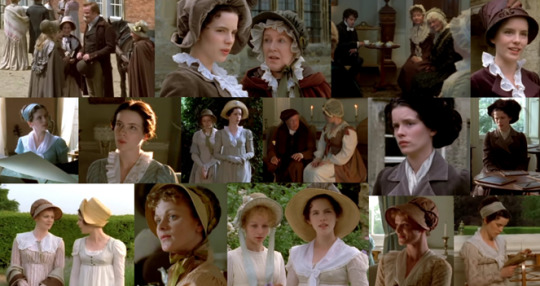
As you can see, a rich tapestry of brown and beige. And this isn’t selective. this is (just about) every day-wear outfit in the movie (barring repeats and a few exceptions that I’ll give mention to below.)
Emma’s outerwear is brought to you by Hershey’s Chocolate. Also I’m not certain but I think that her light brown redingote is the same one as Elinor’s in the 1995 Sense and Sensibility? If anyone can confirm, drop it in the comments.
Perhaps the evening wear will be more colorful?

Barely – Mrs. Weston in a brownish orange; Mrs. John Knightley in an orange-ish brown; Emma gets a dark blue? Or is that just the wintery glow from the window on a dark green velvet? Green (either so dark it’s almost black, or washed-out mint) appears to be the only color Emma is allowed to wear other than brown or ivory/white. Even her gown for the Crown Inn Ball (upper right) is an underwhelming and rather dingy ivory. The champagne number she wears for Christmas at Randalls is not only lack-lustre, but also sports what I’m now calling a “Bridgerton Bust” (where the Empire waist comes up too high, with the seam apparently resting across her bust rather than under it.)
The pink frock (seen properly only from the back) on Mrs. Weston is as close to real color as a main character gets in this production, and can be recognized as one of Jane Bennet’s dresses from the previous year’s Pride and Prejudice.
Even Jane Fairfax doesn’t get a break. Rather than putting her in Jane Fairfax Blue ™ (honestly, Jane Fairfax being costumed in blue is so consistent at this point Crayola should just name a crayon in her honor - this is gonna come back in future reviews) she gets a black-green evening number with no trim at all, and a succession of what the Ladies over at Frock Flicks like to call the “Dumpy Regency Little White Dress”, or drab gray-blues.
Some of the background dancers in the Crown Inn Ball scene get to wear pink! Why not put Harriet in a nice pink frock for this scene?! Why is this so difficult?!
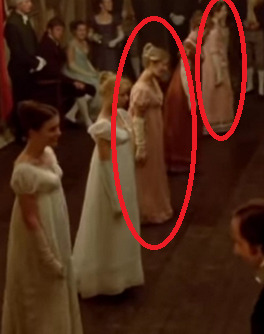
Strawberry picking at Donwell is the only time main characters are consistently wearing identifiable colors that aren’t brown or green: Mrs. Weston in pink, Miss Bates in (oddly the most colorful dress of them all) a nice refreshing lavender blue; Jane gets grey/blue and Mrs. Elton, a pastel mint. Harriet is also given a little break in Mrs. Elton’s introduction scene in a (very) pastel blue frock, while Emma sports white (with a trademark green shawl.)
So how about the...
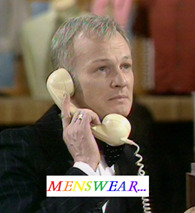
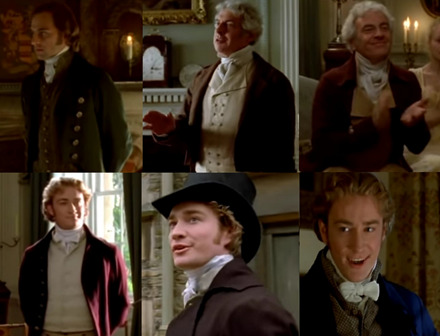
Similarly dull. I almost screamed for joy when I saw that Frank’s jacket was actually blue, and a vibrant blue at that. (The red is too close to brown, I’m sorry.)
So yes, in short the costumes, while perfectly technically accurate (I didn’t get a lot of caps of them but the trousers sufficiently tight, not that I care to look), are drab as a peahen.
As always I’ll outsource any dancing critique by linking Tea With Cassiane on YouTube, since I find her insights on the approach to dancing in Austen adaptations just fascinating and I would like to share such witty and informed reviews.
The Andrew Davies of it All…
*Strong Opinions Ahead*
There are so many reasons why this adaptation isn’t for me. First of all the very idea of making Emma, one of Austen’s most socially complex works (certainly her most vivid) into a sparse 107 minutes is baffling to me. Perhaps I can understand if it’s a Theatrical release but this is a TV production. Why not at least make it a two part special?
And besides the issue that, in order to make this fit the time frame, the story is severely truncated, there’s… the Andrew Davies of it all.
I have some issues with Andrew Davies’ screenwriting for this adaptation particularly. A LOT of issues. Where does one start? I think Knightley is a good place.
It’s not just the casting I don’t like here; but it does say something to me that they chose Mark Strong for this role. It’s a casting decision I discovered with disbelief when I first saw clips from this version in a Period Drama men compilation video on YouTube. I mentioned above that I know Mark Strong as unpleasant characters with man-handling habits. That’s the kind of role Mark Strong is associated with because that’s just what he does well. And I think this played into the casting here, because Davies’ interpretation of Knightley is a bit… fierce. He shouts SO MUCH in this movie and in scenes like the Harriet Smith debacle (where Mr. Knightley of the book even gets a bit angry with Emma) I can understand this, perhaps. But in the book Mr. Knightley takes many pauses to collect and calm himself, because his goal is not to quarrel with Emma but to argue a point. 97 Knightley takes no such pauses and spends the whole scene in what some might call an escalating rage.
Knightley’s cheerful arrival to Hartfield to tell Emma that Robert Martin intended to propose to Harriet is cut out so we start right off with his indignant exclamation of “She refused him?!” and it’s all go from there. To make matters worse, Emma’s own arguments are crippled by Davies’ editing. Many of her more (what might even latterly be considered “feminist”) arguments are cut out. In fact once Knightley gets going, he juggernauts his way through all of his rebukes and speeches from the book, but Emma hardly gets a word in edgewise after arguing that Robert Martin is not Harriet’s equal. What Austen wrote as a heated debate is turned by Davies into a one-sided tirade. (By don’t take my word for it, watch the clip.)
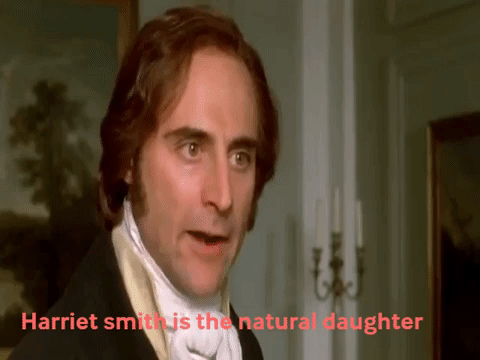
The final cherry on top is having Emma, after Knightley leaves the room with the last word firmly in his grasp, childishly pout “You are wrong Mr. Knightley, and you will see you are wrong and then you will be sorry.” I half expected her to cross her arms and stomp her foot. Worth noting is the fact that Davies adds an additional “It was badly done. Emma,” in this scene where there was none in the book. Rather overkill to my mind. Is this his catchphrase?
At Box Hill, Davies has Knightley begin his climactic rebuke of Emma’s insulting behavior by grabbing her arm and hauling her aside, and concludes by leading her, still holding her arm, to the carriage. Well at least he doesn’t shout at her in this scene; but again, all but one of Emma’s responses are cut out and she stands there, pouting until Mr. Knightley leaves and then she bursts into tears.
When Mr. Knightly proposes to Emma I was feeling good about this scene, until he dropped the “I held you when you were three weeks old” line, and I immediately felt uncomfortable. Maybe you DON’T want mention how you held her when she was a baby after you asked her to MARRY you. But perhaps worse is Emma’s response to the line: “Do you like me as well now as you did then?”
Bringing up holding Emma when she was three weeks old at the proposal (A line which was not in the book) is bad enough but there seems to be a peculiar repeated emphasis on Knightley recalling Emma as a baby. He dragged it up previously when he and Emma make up after the Harriet debacle, as he holds John and Isabella’s baby daughter (whose name, I would mention, is Emma.) In this instance too, the line is a Davies addition.
Let’s talk about Knightley’s strawberry line.
This is delivered in voice-over as a transition to the strawberry picking party at Donwell, and is portrayed as a formal invitation: “Mr. Knightley invites you to taste his strawberries, which are ripening fast.”
At first I was confident that I was reading too much into this (but I think at this point I can safely say that I’m not). I can’t help bursting out laughing every time I hear that line. It was a questionable way to word that if you ask me, especially considering that this is (once again) NOT the line in the book, and it was NOT a formal invitation. It was said to Mrs. Elton and intended to be a joke.
“You had better explore Donwell then,” replied Mr. Knightly “That may be done without horses. Come and eat the strawberries; they’re ripening fast.”
‘ If Mr. Knightly did not begin seriously, he was obliged to proceed so...’
And here I thought Janeites hated adaptations that cut out “Miss Austen’s biting wit.”
To top it all off, we have Frank Churchill (Who I have already pointed out is a bit of a creep in this adaptation and even more detestable than he already was as Austen wrote him) praising Jane: this would be fine, if he wasn’t drooling into Emma’s ear about the turn of Jane’s throat, (He actually utters this line)

and how fine his dead aunt’s jewels will look against her skin. May I just be the first to say “Ehewhegaugh”.
I juxtapose this with the book where Frank's lines are almost exactly as Davies renders them, except Jane Austen never wrote the "have you ever seen such a skin?" Line. The difference i have highlighted in bold:
"... She is a complete angel. Look at her. Is she not an angel in every gesture? Observe the turn of her throat. Observe her eyes as she looks up at my father. --- You will be glad to hear that my uncle intends to give her all my aunt's jewels. They are to be new set. I am resolved to have some in an ornament for the head. Will it not be beautiful in her dark hair?"
Because talking about how pretty your fiancee's hair is, is normal and marginally less creepy than talking about what a fine skin she has or how lovely your (i cannot stress this part enough) dead aunt's jewels will look against it. Davies' script also makes no mention of having them reset, which makes me think he’s talking about the actual necklaces and bracelets Mrs. Churchill would have worn.
But hey, maybe its just a me thing.
Harriet Smith’s story suffers, primarily, I can with some candor admit, due to the time constraints. After Mr. Elton is married, we never see Harriet in any distress. It’s almost as though she’s forgotten all about it! Emma never has to appeal to her to exert herself or to move on. Perhaps this is better than Doran Godwin’s Emma gaslighting Harriet and manipulating her by constantly chastising her for… well general heartbreak (but that’s a bugaboo for a different review.)
My last complaint of note is that ludicrous harvest feast at the end of the movie. The whole concept of this scene just does not seem at all Janely to me. I was under the impression that I was meant to be watching an Austen. Not some bullshit Thomas Hardy knock-off. This is another Davies touch and I hate it more on the principal that it is one of his numerous, obsessive tweaks made solely to point out the existence of the lower classes.
If Davies wanted to show Mr. Knightley’s being an attentive landlord and gentleman farmer then I don’t see why he couldn’t just show Knightley actually running his farm?
“Okay’, you might say, “but I think the highlighting of the servants is to show how good Knightley is by treating them like real people compared to everyone else”, and I hear you. And in the situations where that is the case, like him greeting the Woodhouse’s butler and asking after his family I think that’s totally fine and in character. But things like the servants moving the knee cushions every time someone moves down the line at strawberry picking, to me, is AS ridiculous as the “servants clipping the lawn on their hands and knees with tiny scissors” trope. Like we get it, people took the lower classes for granted, but I don’t think it’s a stretch to say that it would be easier and more realistic to have Mrs. Elton have to move her own knee cushion. I don’t think Knightley would instruct his servants, who he treats so well, to do that kind of thing, but you could write in Mrs. Elton’s expectation of it if you wanted. It seems like the kind of thing she would expect the landed gentry to do.
Screenwriter for some of the best loved Austen’s (including the sacrosanct 1995 P&P Mini-series and my favorite Sense & Sensibility), I thought of Davies for years as untouchable; until Sanditon happened and left everyone who knows anything about Jane Austen really wondering where this mess came from. I put it to you now that it was there in Davies all along.
Davies admitted, when talking about the drastic “Sexing Up” he did in Sanditon that he felt Austen’s works could have done with a bit more sex appeal. I can hardly disagree and additions like Darcy’s little swim in the pond and Edward Ferrars’ angsty wood-chopping are welcome and beloved. But it seems that what he really wanted all along was what he gave us in Sanditon; and finally, without actual source material to stand in his way, he had a chance let his dirty old man show and gave “Austen” the sexing up he thought it needed.
And it gets more troubling as you look back.
In my opening paragraph to this review I mentioned a 2008 blog post that not only agreed with me that there’s something very off about this screenplay, but gave me some possible insights as to why. It points out numerous things that I have always questioned in this version but have never seen anyone else criticize (though I am informed that more recently it has gained its’ share of critics). In fact the post itself actually points out that almost no one in the Austen Blog-sphere had (at that point) criticized this version’s faults in any meaningful way, but my favorite thing about it is that it points out what you find in Davies’ screenplay if you pay careful attention to it “Rather than sitting there and cataloguing what is “technically faithful and whatnot”.
Many Austen bloggers have kind of been playing Miss Taylor to Davies’ Emma for some two decades and change.
The most troubling thing of all is Davies own comments on Mr. Knightley (and other things, more inferred in his screen play). All of the aspects of this interpretation of Knightley that I mentioned earlier seem to stem from the fact that, as quoted in Sarah Caldwell’s book on his works, Davies thinks there’s “Something odd going on with Knightley.”
Davies clearly reads foul, or at least questionable, intentions in Mr. Knightley but I find it interesting that, rather than cutting out material he may have found troubling about Knightley in the book out of his screenplay, he doubled down by adding MORE troubling lines and situations (that were never in the book at all, and imagined solely by himself) in a romantic story with a happy ending.
Perhaps there’s not so much something odd going on with Knightley, Mr. Davies, but with you.
Final Thoughts
At this point I might ask what it is that everyone sees in this version that makes them think it’s so perfect, but that would be a bit pointless since all I’ve read since I discovered this version is people on elaborating on just that and I don’t care to hear much more.
“The lines are verbatim!” textually, perhaps, but it’s the ones that added that trouble me.
“The leads have so much chemistry!” I’m glad you think so, but I can’t find it.
“The costumes are damn near perfect!” And brown. So, so very brown.
As a 90's TV period drama, this version is pretty standard. It sticks to the book (except in those places where the screenwriter saw fit to dabble with some subtle but troubling suggestions about the characters.) And if it floats your boat, as always I'm glad it gives you what you want from the story.
I know I hold unpopular opinions on Jane Austen adaptations, and perhaps this is one of them, but every time I watch this version I feel the need to read the book as a cleanse. Perhaps Davies’s ferocious Knightley was simply a pendulum swing reaction to Douglas McGrath’s almost too laid back interpretation in the Miramax film from earlier in 1996, but even if that’s the case it’s just uncalled for and is my biggest turn off for this film.
Tone: 3
Ribbon Rating: Badly Done! (40 Ribbons)
Casting: 5
Acting: 6
Scripting: 4
Pacing: 2
Cinematography: 4
Setting: 3
Costumes: 5
Music: 2
Book Accuracy: 6
29 notes
·
View notes
Text
My Favorite Films and Performances of 2020
“I wish I could’ve seen it on the big screen.”
It was a strange year, and even stranger year of movie watching. In 2020 I saw only one of my top films in a theater, which is crazy (like much else over these past months). But the experience of keeping up with the movies this year was a reminder that great filmmaking can transcend the specifics of the viewing experience. In your living room, in bed, projected onto the side of a garage, streaming on Twitch, broken up into multiple sittings, maybe even on your phone (desperate times)… if doesn’t matter as long as it connects with you. A great film has the power to soothe and transport, to alter your perspective, to re-wire your brain. So while I didn’t get on a single airplane last year, I definitely went places. And I’m grateful for these changes of scenery. For the time-travel as well; last year in my house, we found great comfort in revisiting a bunch of old favorites. It was also an opportunity to finally watch a number of those older films that had someone evaded us… a year of catching up, now or never. We were members of a weekly movie club for some months — that was cool. Another pleasant silver lining was the emergence of virtual film festivals, which have been a fantastic opportunity. I hope that they can continue in some form when this pandemic is in the rearview. Because, you know, getting to Park City is a real schlep. All this to say: like you, I’ll always remember 2020. In this truly crummy year, the movies really helped.
I’m including some of the film festival stuff that’s coming out a little later, because the boundaries between 2020 films and 2021 films feels blurry to me without proper theatrical releases.
TOP 5, loosely ranked. I love these deeply.
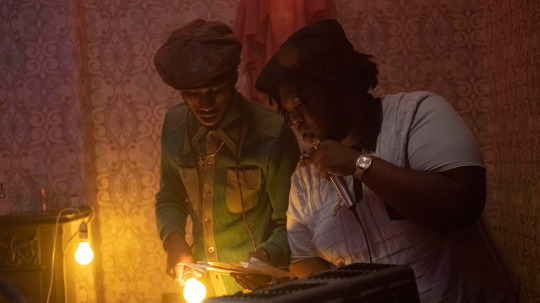
1. LOVERS ROCK, Steve McQueen
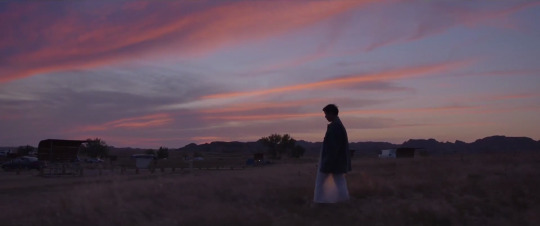
2. NOMADLAND, Chloe Zhao

3. ANOTHER ROUND, Thomas Vinterberg
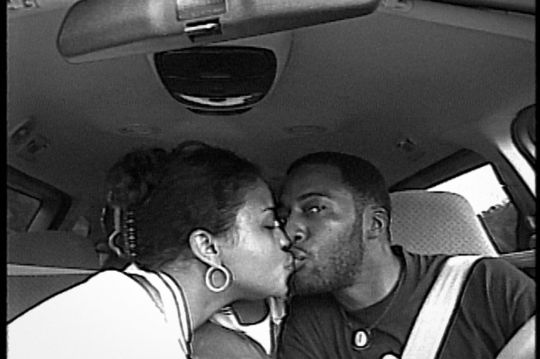
4. TIME, Garrett Bradley
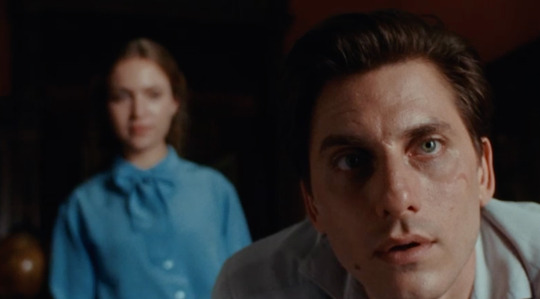
5. MARTIN EDEN, Pietro Marcello
--------------------
The rest of the Top 25, in alphabetical order. I loved these.
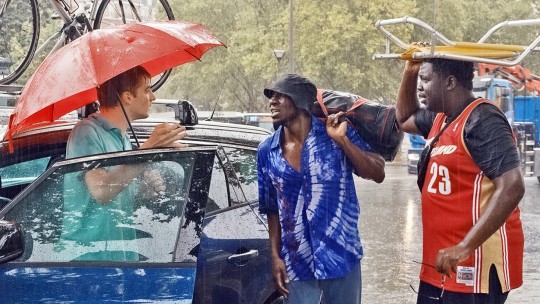
À L’ABORDAGE, Guillaume Brac
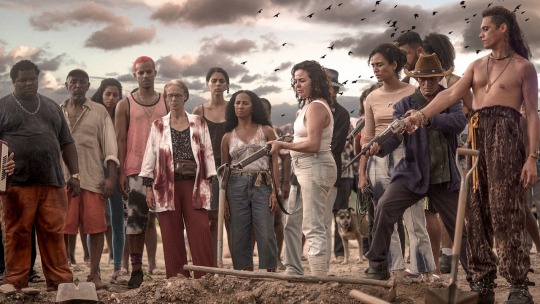
BACURAU, Kleber Mendonça Filho
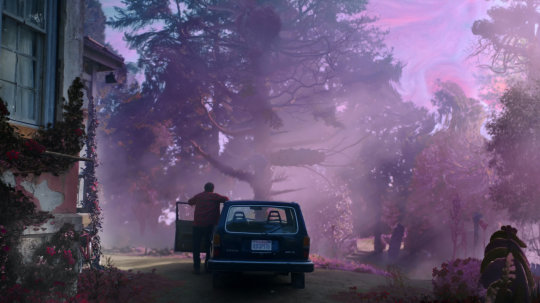
COLOR OUT OF SPACE, Richard Stanley
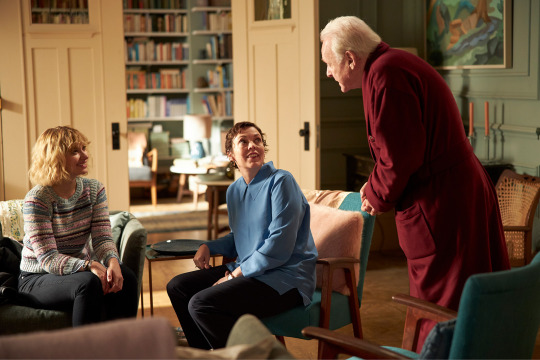
THE FATHER, Florian Zeller
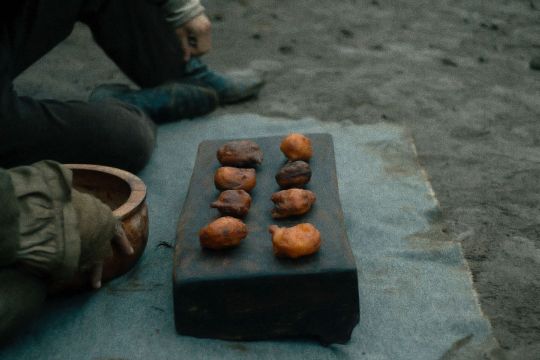
FIRST COW, Kelly Reichardt
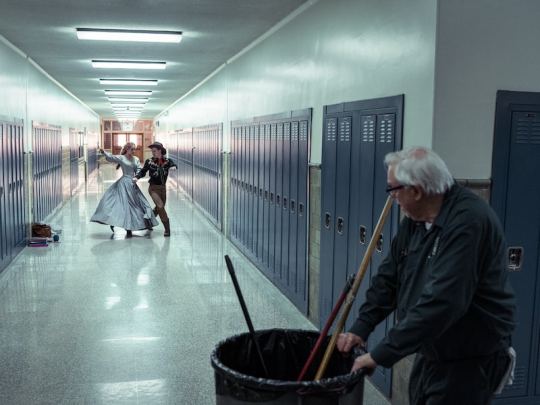
I’M THINKING OF ENDING THINGS, Charlie Kaufman
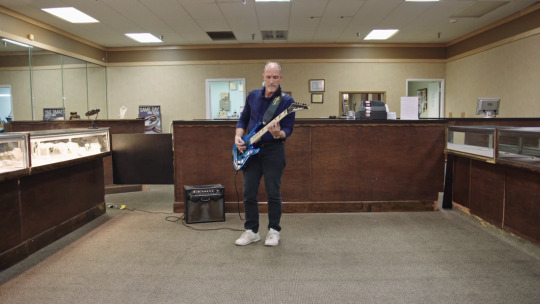
JASPER MALL, Bradford Thomason and Brett Whitcomb
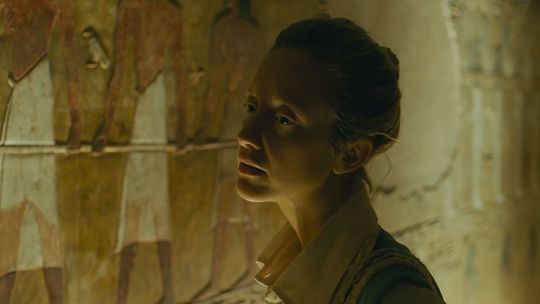
LUXOR, Zeina Durra
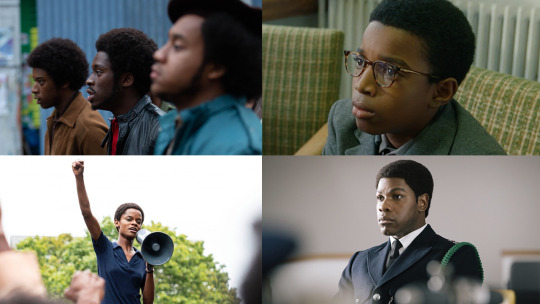
ALEX WHEATLE / EDUCATION / MANGROVE / RED, WHITE AND BLUE, Steve McQueen
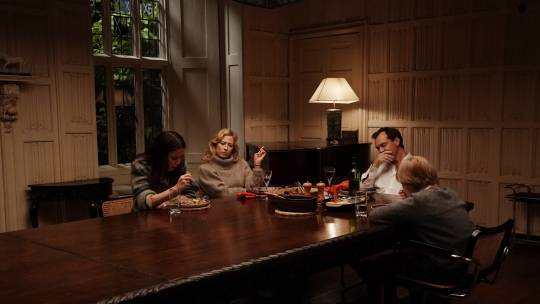
THE NEST, Sean Durkin
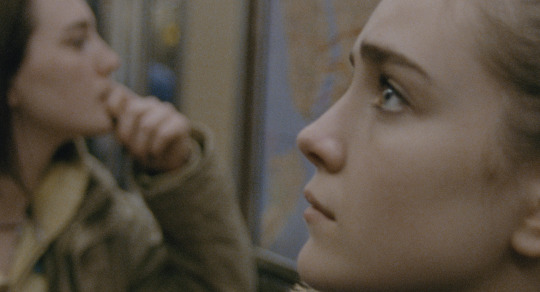
NEVER RARELY SOMETIMES ALWAYS, Eliza Hittman
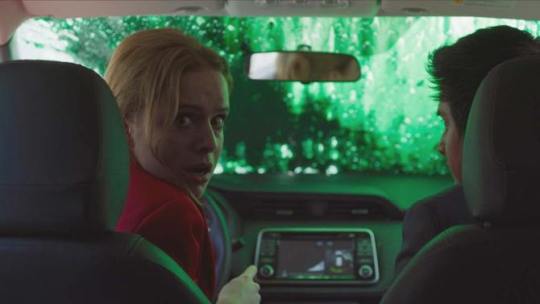
NEW ORDER, Michel Franco
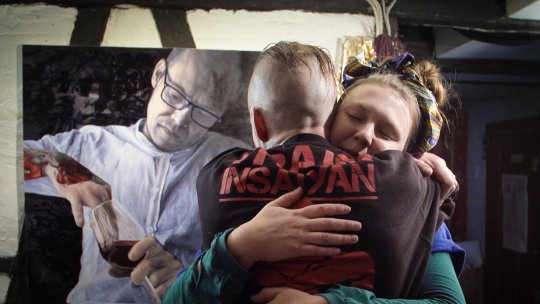
THE PAINTER & THE THIEF, Benjamin Ree
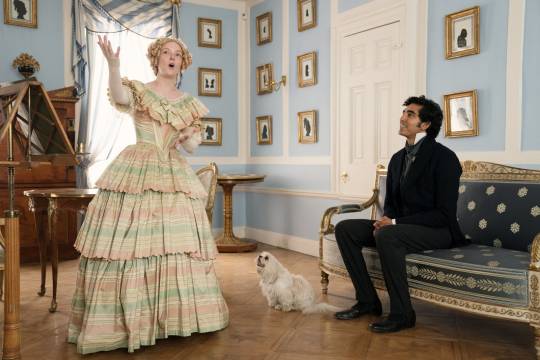
THE PERSONAL HISTORY OF DAVID COPPERFIELD, Armando Iannucci
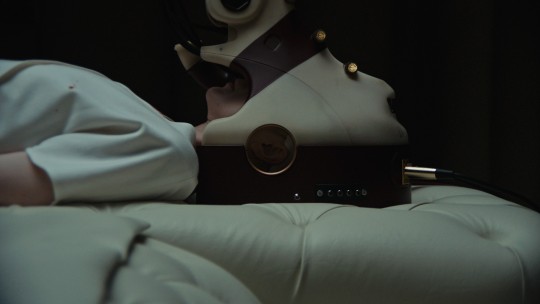
POSSESSOR, Brandon Cronenberg
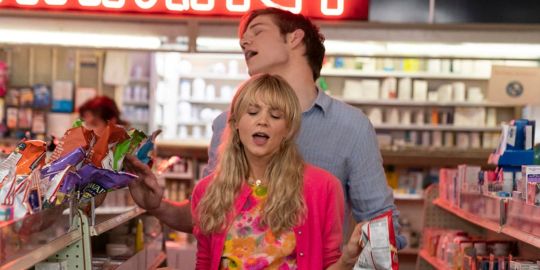
PROMISING YOUNG WOMAN, Emerald Fennell
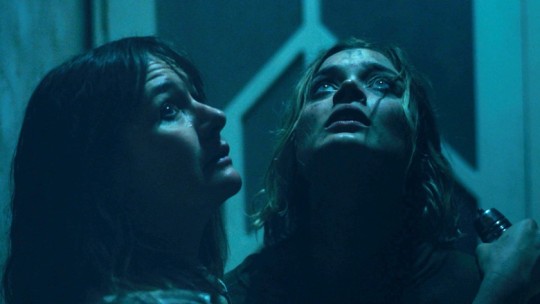
RELIC, Natalie Erika James

SAINT FRANCES, Alex Thompson
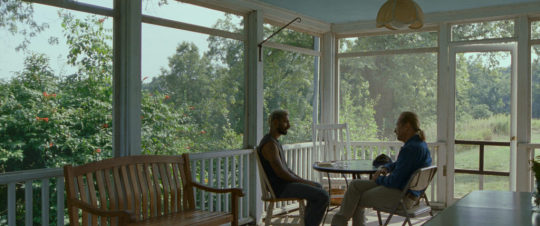
SOUND OF METAL, Darius Marder
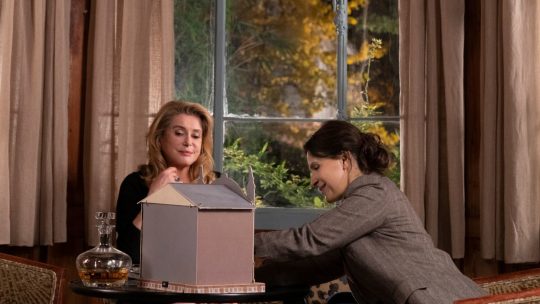
THE TRUTH, Hirokazu Koreeda
--------------------
I also enjoyed (some more than others):
Apples, The Assistant, Babyteeth, Bad Education, Black Bear, Blow the Man Down, Borat Subsequent Moviefilm, Butt Boy, The Climb, Da 5 Bloods, Deerskin, Emma, The Father (Bulgaria), Greed, His House, The Hunt, I Used to Go Here, I'm No Longer Here, Impetigore, The Intruder, The Invisible Man, Kajillionaire, La Llorona, Let Them All Talk, Lost Girls, The Man Who Sold His Skin, Mank, Never Gonna Snow Again, News of the World, One Night in Miami, Palm Springs, Preparations to Be Together for an Unknown Period of Time, Rebecca, She Dies Tomorrow, Shirley, Slow Machine, Sorry We Missed You, Soul, Spree, Straight Up, A Sun, Swallow, Tenet, Tesla, Tommaso, The Traitor, The Trip to Greece, True History of the Kelly Gang, Uncle Frank, Under the Open Sky, The Vast of Night, Vitalina Varela, Wendy, The Whistlers, Wildland, Young Ahmed
--------------------
And these documentaries!
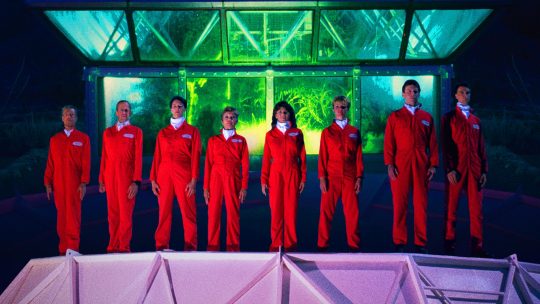
American Murder: The Family Next Door, The American Sector, Assassins, Beastie Boys Story, The Bee Gees: How Can You Mend a Broken Heart, Bloody Nose Empty Pockets, Boys State, Brainiac: Transmissions After Zero, Circus of Books, Class Action Park, Collective, Crip Camp, David Byrne's American Utopia, Dick Johnson is Dead, Fireball: Visitors From Darker Worlds, The Go-Go's, Gunda, Miss Americana, MLK/FBI, The Mole Agent, Mucho Mucho Amor: The Legend of Walter Mercado, My Psychedelic Love Story, Mystify: Michael Hutchence, Narrowsburg, On the Record, Other Music, Sisters with Transistors, Spaceship Earth, The Way I See It, Whirlybird
--------------------
And these shorts:
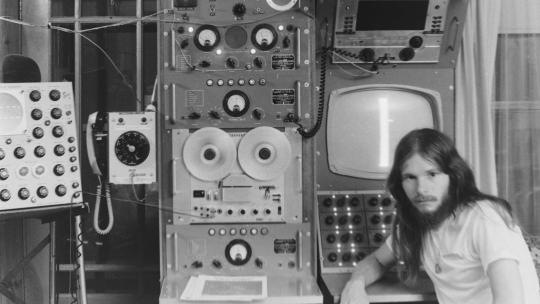
Bye Bye Body (which I edited), Fit Model, Friday Night Pizza for Daddy, Hard Cracked the Wind, The Human Voice, John Was Trying to Contact Aliens, Michael's Preference West, What Did Jack Do?, World of Tomorrow Episode Three: The Absent Destinations of David Prime
--------------------
My favorite performance of the year:
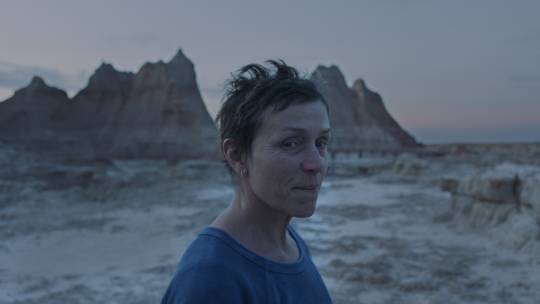
Frances McDormand as Fern in Nomadland
--------------------
Favorite ensembles:
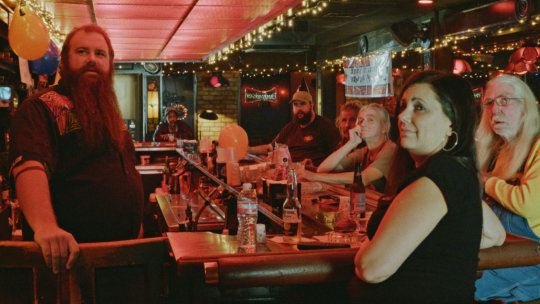
À l’abordage, Another Round, Bad Education, Babyteeth, Bloody Nose Empty Pockets, Blow the Man Down, Emma, First Cow, Kajillionaire, Let Them All Talk, Lovers Rock, Mangrove, Mank, One Night in Miami, The Personal History of David Copperfield, Promising Young Woman, True History of the Kelly Gang
--------------------
More memorable (and in some cases under-discussed) performances:
Christopher Abbott as Colin Tate in Possessor and as Gabe in Black Bear
Idir Ben Addi as Ahmed in Young Ahmed
Riz Ahmed as Ruben Stone in Sound of Metal
Daniel Algrant as Kelvin Kranz in Let Them All Talk
Maria Bakalova as Tutar Sagdiyev in Borat Subsequent Moviefilm
Haley Bennett as Hunter Conrad in Swallow
John Boyega as Leroy Logan in Red, White and Blue
Rob Brydon as Rob Brydon in The Trip to Greece
Jessie Buckley as Young Woman in I’m Thinking of Ending Things
Nicolas Cage as Nathan Gardner in Color Out of Space
Salif Cissé as Chérif in À L’abordage
Sheyi Cole as Alex Wheatle in Alex Wheatle
Cleopatra Coleman as Trina in The Argument
Carrie Coon as Allison O’Hara in The Nest
Michael Angelo Covino as Mike in The Climb
Willem Dafoe as Tommaso in Tommaso
Charles Dance as William Randolph Hearst in Mank
Catherine Deneuve as Fabienne Dangeville in The Truth
Katie Findlay as Rory in Straight Up
Sidney Flanigan as Autumn in Never Rarely Sometimes Always
Johnny Flynn as George Knightley in Emma
Julia Garner as Jane in The Assistant
Robbie Gee as Simeon in Alex Wheatle
Chris Giarmo as himself in David Byrne’s American Utopia
Betty Gilpin as Crystal Creasey in The Hunt
Ethan Hawke as Hank in The Truth
Kris Hitchen as Ricky Turner in Sorry We Missed You
Anthony Hopkins as Anthony in The Father
Jonathan Jules as Dennis Isaacs in Alex Wheatle
Sandra Guldberg Kampp as Ida in Wildland
Joe Keery as Kurt Knuckle in Spree
Udo Kier as Michael in Bacurau
Orion Lee as King Lu in First Cow
Delroy Lindo as Paul in Da 5 Bloods
Peter Macdissi as Walid "Wally" Nadeem in Uncle Frank
Matthew Macfadyen as Wilcock in The Assistant
George MacKay as Ned Kelly in True History of the Kelly Gang
Yahya Mahayni as Sam Ali in The Man Who Sold His Skin
Luca Marinelli as Martin Eden in Martin Eden
Tuppence Middleton as Sara Mankiewicz in Mank
Mads Mikkelsen as Martin in Another Round
Wunmi Mosaku as Rial in His House
Elisabeth Moss as Cecilia Kass in The Invisible Man
Kelly O'Sullivan as Bridget in Saint Frances
Shaun Parkes as Frank Crichlow in Mangrove
Robert Pattinson as Neil in Tenet
Paul Raci as Joe in Sound of Metal
Kadeem Ramsay as Samson in Lovers Rock
Gayle Rankin as Marissa in The Climb
Tanya Reynolds as Mrs Augusta Elton in Emma
Tyler Rice as Detective Russell Fox in Butt Boy
Andrea Riseborough as Hana in Luxor
Cecilia Roth as Marta in The Intruder
William Sadler as the Grim Reaper in Bill & Ted Face the Music
Kenyah Sandy as Kingsley Smith in Education
Amarah-Jae St. Aubyn as Martha Trenton in Lovers Rock
David Strathairn as David in Nomadland
Michael Stuhlbarg as Stanley Edgar Hyman in Shirley
Swankie as Swankie in Nomadland
Tilda Swinton as Woman in The Human Voice
Kristin Scott Thomas as Mrs. Danvers in Rebecca
Steve Toussaint as Ken Logan in Red, White and Blue
Alec Utgoff as Zhenia in Never Gonna Snow Again
Jairaj Varsani as young David Copperfield in The Personal History of David Copperfield
Ben Whishaw as Uriah Heep in The Personal History of David Copperfield
Sharlene Whyte as Agnes Smith in Education
Letitia Wright as Altheia Jones-LeCointe in Mangrove
Ramona Edith Williams as Frances in Saint Frances
Kôji Yakusho as Masao Mikami in Under the Open Sky
Youn Yuh-jung as Soon-ja in Minari
Helena Zengel as Johanna Leonberger in News of the World
--------------------
Favorite pre-2020 films I saw for the first time in 2020:
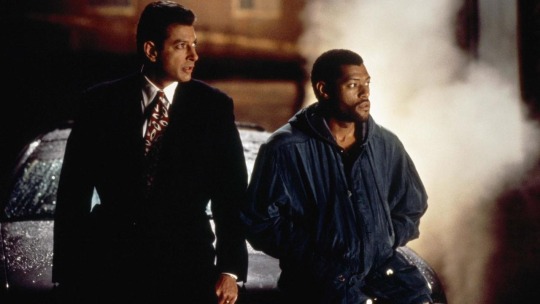
Blood on the Moon, But I’m A Cheerleader, Crooklyn, Cure, Daughters of the Dust, The Death of Dick Long, Deep Cover, The Draughtsman's Contract, Eyes of Laura Mars, Give Me Liberty, Greener Grass, Hardcore, High Hopes, The Last Party, Long Day's Journey into Night, Maiden, One Day Pina Asked, Persona, Right Now Wrong Then, Right On!, The Seventh Victim, Slightly French, Synonyms, Tammy and the T-Rex, Variety, The Watermelon Woman... and a tip of the hat to Coppola's new The Godfather Part III recut, The Godfather, Coda: The Death of Michael Corleone
42 notes
·
View notes
Text
The Magnus Archives Relisten: Episode 92 - Nothing Beside Remains
And yet here, in this empty world, I cannot but spend these nights, these dreadful, silent nights, huddled and frozen in some terrible fear I find myself unable to name. I almost think I hear the mocking joy of my friends, but there is nobody here, and never shall be again. - Statement of Barnabas Bennett
Excuse me while I scream.
And it was not out of malice, or because he lacked affection for Barnabas Bennett: he retrieved those bones sadly enough when the time came. Bones that you can still find in my office, if you know where to look. No, it was because he was curious. Because he had to know, to watch and see it all. - Elias
a) Is this the text passage that spawned the Jonah/Barnabas ship I've been seeing around? Is it because he kept the bones for all those centuries? b) This is actually a really vivid and horrifying way to describe what the Eye does to its worshippers. No word wasted there and yet it makes it all so perfectly clear...
Tim: Oh, Christ, what is it now? Melanie: Er, yeah, same question, please.
Okay, this made me grin.
Elias: And I killed Jurgen Leitner because he was… an unnecessary complication. Likely to tell John too much, too early.
Why did I not ask myself harder what Elias meant by that, exactly...
Basira: Daisy, where do I know that name from? Daisy: Oh, the Yousuf case. An Introduction to Higher Anatomy. Basira: Ah… Oh, god! And you killed him? You sure we shouldn’t be giving him a medal?
Do I want to know what the Yousuf case was all about? I'm assuming some extensive body horror, just from the title of the book.
Jon: What about Michael? Elias: What about him? An irritant. Interfering because he’s bored, and he resents us. He has no purpose –
RUDE!
Elias: For someone who used to be a detective, you’re remarkably reluctant to think things through. You think you’re the only police officer eager to do violence and call it justice? No, there are plenty of other rabid dogs out there, mad with the hunt. And some of them have signed a Section 31. There are plenty of others your superiors can call on to clean up this mess. Basira: Er… they wouldn’t. Daisy: Yeah. They would.
a) No, I didn't get that when Elias says 'rabid dogs mad with the hunt' he's referring to one of the fears. I don't think the Hunt had been mentioned by name at this point and I just didn't notice the signs that were obviously there. b) Seems like a relatively realistic view of the state of the police... c) ... Daisy just casually going "Yeah, of course they would" is rather chilling.
Martin: Okay, wai-wai-wai-wait, that’s the police that you’re talking about! Okay, they… they wouldn’t… Would they?
Martin, on the other hand, is being a bit more naive than he really has any right to be.
Elias: A contract of employment. For Basira. (...) Jon: Oh, no…
That whisper, no, breath of "Oh no" from Jon in the background says so damn much.
Elias: You never wanted this, no. But I’m afraid you absolutely did choose it. In a hundred ways, at a hundred thresholds, you pressed on. You sought knowledge relentlessly, and you always chose to see. Our world is made of choices, Jon, and very rarely do we truly know what any of them mean, but we make them nonetheless.
I'm not even sure what to say about this. You could probably write entire analyses of the concept of choice and the lack thereof in TMA with this quote as a foundation. I'm not going to, though, I'm just going to leave this here as "highly notable quote".
Jon: Am I… Elias, am I still human? Elias: Jon, what does human even mean? I mean, really? You still bleed, you can still die. And your will is still your own, mostly. That’s more than can be said for a lot of the ‘real’ humans out there.
'What does human even mean' is also one of those things that TMA keeps coming back to, especially with regard to Jon's character arc.
Elias: Good. Well, I have work to be getting on with. I’ll send you a Return to Work form, but don’t worry about the doctor’s note.
Pfffff. Gotta keep the bureaucracy up to date!
My impression of this episode
So the issue with this episode is that I am REALLY, REALLY bad at telling voices apart. Like, comically bad. Basically all the female characters (aside from Gertrude) sound the same to me and among the recurring male characters, I can only consistently tell Martin apart from the rest of them. Up to this episode that wasn't a problem because context always made it immediately apparent who was speaking and the characters weren't ever all in the same room but this episode - well, I think I spent most of the non-statement part of the episode trying to play catch-up on who was actually talking, making it really difficult to actually have emotions aside from the desperate flailing of trying to keep up with the plot (which there is rather a lot of). It's a lot easier with the transcript in front of me as I listen. As for the statement, oh god, the concept of being stuck in the Lonely forever is fucking terrifying. The Lonely usually gets me but I think it gets me hardest when it's cut down to its essentials and it doesn't get much more essential than "You're alone in the world. There is nobody else and there never will be again." I somehow doubt Barnabas died of old age, I sure as hell wouldn't have.
7 notes
·
View notes
Note
Georgia + former English major that likes cookies (so possibly literary destinations and bakery destinations?)
So I nailed the author portion of this!
Columbus, GA
A native of Columbus, Georgia, Carson McCullers is best known for her first novel, The Heart is a Lonely Hunter, which was published when she was 23 years old. McCullers lived in several places during her lifetime, including North Carolina and New York, but her years spend in Georgia made an indelible mark on her life and work. http://mccullerscenter.org/
https://www.southernliving.com/travel/georgia-literary-road-trip
Atlanta, GA
Martin Luther King, Jr.: Preacher, essayist, Nobel Peace Prize Laureate; Atlanta, Ga.
1.The Civil and Human Rights Museum, 100 Ivan Allen Jr. Blvd., Atlanta, GA 30313-1807. http://www.civilandhumanrights.org/
Designated room contains selections from King’s papers owned by Morehouse University. Includes first pages (handwritten) of sermons; notecards for doctoral dissertation on Paul Tillich and Henry Wieman;
notes from Selma jail to Andrew Young ( a to-do list outlining ways to bring attention to Selma); annotated “Letter from Birmingham Jail” in Christian Century, 1963 (one of first published versions, basis for later revisions); Eulogy for Four Little Girls murdered in church bombing, Birmingham 1963 (typed and then revised by hand); hand draft “Why I Am Opposed to the War in Vietnam”; much more.
2. King’s birthplace, Ebenezer Baptist Church, tomb. National Park Service, tours available. (King Historic District, Atlanta) http://www.nps.gov/malu/index.htm
Joel Chandler Harris: Folkorist (The Uncle Remus Stories), Atlanta, Eatonton – he seems kind of shady??
The Wren’s Nest: Home of Joel Chandler Harris, Atlanta
http://www.wrensnest.org/ 1050 Ralph David Abernathy Blvd. SW, Atlanta 30310, 404-753-7735. See this earlier post on The Wren’s Nest: https://readersunbound.com/2013/11/20/the-wrens-nest-forty-years-later/
Located in Atlanta's historic West End, The Wren’s Nest is Atlanta's oldest house museum and has been operating for more than 100 years. The mission of The Wren's Nest is to preserve the legacy of Joel Chandler Harris and the heritage of African-American folklore. Docents provide tours Tuesday through Saturday, and storytellers tell every Saturday at 1 p.m. and by appointment. Admission is $9.
Robert Frost
See this earlier post on the Robert Frost Collection at Agnes Scott: https://readersunbound.com/2014/04/09/frost-in-springtime/
Athens, GA
The Georgia Writers Hall of Fame
Richard B. Russell Building Special Collections Libraries
University of Georgia Libraries
Has a collection and knowledge on African American Georgia writers, teaches classes, and is open certain days (check: https://georgiawritershalloffame.org/contact-us).
https://atlantadailyworld.com/2019/02/28/georgias-rich-heritage-of-african-american-writers-in-its-writers-hall-of-fame/#:~:text=Of%20course%2C%20there%20are%20many,Johnson%2C%20an%20Atlanta%20native%20and
Eatenton
Alice Walker
But the Hall also has honored the writings of Alice Walker, who grew up in Eatonton, Ga., the daughter of a sharecropper, who went on to write “The Color Purple,” for which she was awarded the Pulitzer Prize. Walker wrote six novels and three volumes of short stories. A self-guided driving trail includes the chapel where Alice was baptized, her childhood home, her birthplace, and the birthplace of her mother.
Georgia Writers Museum
While you're in Eatonton, visit the Georgia Writers Museum, which focuses on promoting the rich, literary heritage of the state. Permanent exhibits honor the three most famous local authors, Alice Walker, Flannery O’Connor and Joel Chandler Harris. Works and artifacts of the other authors are featured in the museum on a rotating basis. The museum is open Friday through Sunday.
Uncle Remus Museum
Gather around the fireside for the adventurous tales of Brer Rabbit, and learn about the life and writing of Joel Chandler Harris at the Uncle Remus Museum in Eatonton. The site of the museum was a part of the original home place of Joseph Sidney Turner, the "Little Boy" in the tales of Uncle Remus. The museum is open 7 days a week, and adult admission is only $5.
Flannery O'Connor's Homes
A short drive from Eatonton, you can tour Andalusia Farm in Milledgeville, where O'Connor lived with her mother from 1951-1964 and where she completed the bulk of her literary work. It was on this 544-acre estate that she wrote her last book. Admission is $7.
As a child, O'Connor lived on 207 E. Charlton Street in Savannah. In 1989, the property was restored and turned into a museum with a book collection, toys, family pictures of O'Connor and a tiny desk that was especially made for her. Admission to the Flannery O'Connor Childhood Home is $8.
The Mercer Williams House Museum
When journalist John Berendt visited Savannah, he was inspired to turn a local murder case into the acclaimed novel, “Midnight in the Garden of Good & Evil.” The Mercer Williams House Museum, the location of the murder, is open to visitors daily. Admission is $12.50.
Savannah
Flannery O'Connor Childhood Home, Savannah
After seeing where the famed author spent her last years, travel to Savannah to learn about O'Connor's early years. Visitors to the home may view rare books in the library and tour the garden where five-year-old O'Connor famously taught a chicken to walk backward. Special 45-minute group tours, discounted to $4 per person, are available outside of normal hours with advance request. Groups are kept to 15 people or fewer to ensure a quality experience.
Midnight in the Garden of Good and Evil Book & Movie Tour, Savannah
Join Savannah Heritage Tours for a glimpse into the life of this famed novel's main character, Jim Williams. The two-and-a-half-hour Midnight Book and Movie Tour includes Bonaventure Cemetery and several homes Williams owned and restored. The three-hour Grand Midnight Tour adds historic Mercer House, Williams' home and the setting of pivotal scenes in the story. Motor coach tours include the main book destinations, the Historic District, St. John The Baptist and other sites. Customized tours require a minimum of six guests and 48 hours notice. savannahheritagetour.com
Savannah – literary festival – maybe 2022?
https://www.savannahbookfestival.org/
A note about Native American authors:
I couldn’t find any contemporary sites for Native American authors, but two of the largest tribes before displacement were Muscogee (Creek) and Cherokee. Here are some authors I found, so please do a virtual road trip!
· Annette Arkeketa, Otoe-Missouria-Muscogee Creek
· Eddie Chuculate, Muscogee Creek Nation-Cherokee,[56] b. 1978
· Elizabeth Cook-Lynn, Crow Creek Lakota, b. 1930[60]
· Joy Harjo, Muscogee Creek Nation-Cherokee,[88] b. 1951
· Suzan Shown Harjo, Southern Cheyenne-Muscogee Creek
William Harjo LoneFight, Muscogee Creek Nation-Natchez, b. 1966
Janet McAdams, Muscogee Creek-descent[73]
Alexander Posey, Muscogee (Creek) Nation, 1873–1908
Cynthia Leitich Smith, Muscogee Creek, b. 1967
Owl Goingback, Eastern Band Cherokee-Choctaw-descent,[81] b. 1959
3 notes
·
View notes
Text


From the John Martin Rare Book Room
De nivis usu medico observationes variae by Thomas Bartholin, and printed in Hafniae [Copenhagen] by Matthias Godiche for Peter Haubold [bookseller], 1661.
Happy December, friends. With winter comes snow and frigid temps, of course. As you walk around, breathing in the crisp air and having your face go numb from the wind and snow, you may think to yourself, "Hmm, I wonder if anyone ever considered using snow as anesthesia?" The answer is a stone–cold "yes."

We're highlighting the work from the prodigious 17th–century Danish physician Thomas Bartholin (1616–1680). Beyond looking like Billy Joel in his heavy metal days (yes, that was a thing), Bartholin rocked a strong scientific mind and was a prolific writer. He corresponded with many of the greatest thinkers of his day, wrote over 20 books (including one on unicorns!), and conducted many experiments.
One area he dabbled in was refrigeration anesthesia (the application of cold to deaden sensation, known today as cryoanesthesia). The application of something cold has long been known to help reduce pain. Medieval physicians, such as Ibn Sina, were the first to write about it.
In De nivis usu medico observationes variae [Various observations on the medical use of snow], Bartholin picks up where those medieval writers left off, thoroughly examining all the medical applications of snow, including as a topical anesthetic.
Chapter XXII makes the first known mention of the use of mixtures of ice and snow for freezing to produce surgical anesthesia, crediting the Italian physician Marco Aurelio Severino for the technique. To avoid killing the tissues and causing gangrene, the ice–snow mixture was to be applied in narrow parallel lines to the area designated to be cut. After a quarter of an hour, feeling would be deadened and the part could be cut without pain.

Along with about 200 pages detailing all the medical properties of snow (who knew there were so many!), there is also a treatise on snow crystals by Bartholin's younger brother, Erasmus. This is the earliest publication on crystallography and preceded Boyle's Essay about the origine & virtues of gems (1672) by eleven years.
It should be noted that we do not suggest trying Bartholin's methods out for yourself this winter.
--Curator Damien Ihrig
63 notes
·
View notes
Text
Salma Hayek in Savages is One of the Most Underrated Movie Gangsters
https://ift.tt/3lSiG4h
“You thought I wouldn’t notice,” cartel boss Elena Sánchez (Salma Hayek) demands of her loyal caporegime Ludo (a physically and emotionally imposing Benicio del Toro). The brutal and effective killer does not defend himself when the head of his family, and boss of bosses, slaps him with the force of a bull whip. He doesn’t even flinch. That would mean death. Oliver Stone’s Savages may not be his most renowned mob movie offering, but Hayek’s drug lord is one of cinema’s most groundbreaking gangsters.
Stone is no stranger to iconic gangsters. He wrote the screenplay for Brian De Palma’s Scarface, which brought Al Pacino’s coke-fueled Cuban political asylum seeker, Tony Montana, into celluloid’s perennial rogue’s gallery. For his 2012 cartel twist of a gangster film, Savages, Stone let Hayek reset the template. Her Elena Sánchez is street smart, tech savvy and a wiz at business. Her venture is so cut-throat, her underlings sever heads in their enthusiasm. Sánchez commands that much loyalty. Her gang decapitates wayward members, rivals and other stray wolves to bring lambs into the fold. They capture the proceedings on video which they send as messages in introductory offers of hostile takeovers.
Our ostensible heroes in this environment are Ben (Aaron Taylor-Johnson) and Chon (Taylor Kitsch), who’ve been friends since high school. Ben went to Berkeley and took botany classes; Chon went into the military and took seeds. The latter’s tour of duty in Iraq left him seething with trauma but well-trained tactically. His tour in Afghanistan left him tactless, but introduced him to the finest marijuana in the known world. The pair now run a multimillion-dollar cani-business in the era when the plant was on the verge of becoming legalized on the West Coast. They, and their mutual live-in girlfriend O (Blake Lively), are idealists, using their new wealth to invest in philanthropy. Sánchez’s cartel wants them to join the “family.” It is a renowned and venerable matriarchy.
Sánchez’s enterprise is larger than Vito Corleone’s in The Godfather, but then she is a wise and tough-nurturing godmother. Nicknamed La Reina, the boss of the Mexican Baja Cartel doesn’t merely conquer her competitors, she destroys idealism. To get the thing she wants, Elena kidnaps the thing Ben and Chon love most, O. This is a talent, discovering the things which people most treasure. When Tom Hagen reported back to his don in The Godfather, the family father discerned the Hollywood bigshot Jack Woltz loved his prized racehorse more than any other thing on earth. He sent a message.
Elena’s most potent message is a niche-meme of sorts. While streaming live footage of O in tortuous circumstances, she cuts to an animation of O’s head popping off, leaving an ever-increasing stain of blood which ultimately covers the screen. That’s her horse’s head. This is a message movie and that’s “the word.” Hayek is a versatile performer. She brought black comedy subtlety to her roles in The Faculty and Dogma; sensual earth tones to Frida; and romantic fantasy into Once Upon a Time In Mexico. She ratted out her gangster boss in Everly, but made her bones as an assassin in The Hitman’s Bodyguard. Hayek has also proven herself a master thief, stealing From Dusk Till Dawn with one scene which she shared with George Clooney, Quentin Tarantino, and a snake. In Savages, Hayek is allowed to be something female characters are routinely denied: ruthless, amoral, and savage.
Hayek presents a straightforward boss with strong family values. Elena Sánchez took over the cartel after the deaths of her husband and twin sons, but there is no room for irony for the Black Widow character. Hayek expertly balances public bravado and private sorrow. Elena is wise, like someone who paid attention to the lessons of different generations. Warnings about getting high on your own supply, and underestimating the other guy’s greed, would sound perfectly natural coming out her mouth. She’s the antithesis of her prisoner, whom she calls Ophelia after sensing the young woman exudes the need for a mother’s accumulated knowledge. Elena’s own actual daughter similarly rejects the past in the movie, but this is a gangster film tradition, sadly. Every mob boss wants their children to move into a thriving legitimate world. Elena says her daughter is “ashamed of me and I’m proud of her for it.”
The gangland dictator’s only vulnerability is her teenage daughter. It is also Elena’s strength. A mob godfather chalks blood up as an expense. Elena, the mother, is not only capable of doing anything for her children, but also justifying any action because it is done for her children. She only took over the cartel because her son was weak and would have been killed. This makes her character fearless.
Regardless of the hard-bodied eye candy, Taylor-Johnson, Kitsch, and Lively are bland next to Hayek and del Toro, who see entitlement and philanthropy as disgusting conceits of wealth and soft privilege. Lively’s Ophelia is not a deep, William Shakespeare tragic figure. She’s Paris Hilton in a hemp halter top, a seeming trophy for the nouveau stoner rich. O neither shocks nor impresses the crime queen, whose got hideaways and mansions scattered internationally for whim or lam.
“There’s something wrong with your love story, baby,” wise mob boss Elena notes like she’s doling out favors at her daughter’s wedding. “They may love you but they will never love you as much as they love each other. Otherwise they wouldn’t share you, would they?” Their ménage a trois relationship is also seen as absolutely savage to del Toro’s Lado.
The Mexican gang think the gringos lack dignity, tradition, family, and honor. The Californians are appalled by the brutality of the narco-traffickers from south of the border where torture is a routine cost of doing the business. Local D.E.A. agent Dennis (John Travolta) puts his trust in graft. He skims profit from Elena, accepts bribes from her rival El Azul, as well as Lado, and Ben and Chon. Yet he is surprised when he gets bit on the hand at feeding time. “You stabbed a federal agent,” he moans as his faith is shaken in a scene reminiscent of the death of Mel Bernstein in Scarface. Sadly, it only expands Dennis’ jurisdiction.
It is noted in the film that Elena is counting on the reelection of a specific mayor to retain her power base in Mexico. Stone directed the 2009 documentary South of the Border, which presented the untold histories of leftist Latin American presidents. Savages, a commercial film, presents the cultural relationship between Anglo-Americans and Latinos in a way mainstream Hollywood films rarely attempt. Most of this is done through normalizing sequences which act as allegorical bridges, such as when Elena flips back and forth between English and Spanish when chastising Lado and the high-ranking cartel accountant Alex Reyes (Demián Bichir). She is as much a mob representative as when Lado greets Ben with a warm “Welcome to the barrio” as he lets him into his Tijuana hotel suite.
Elena brings an entirely new and unique reworking of the South American narco boss cliché. This is best illustrated with the most subtle of the film’s social commentary, delivered by del Toro, who’d previously won an Oscar for his role in the drug war film Traffic. When Lado drops by Dennis’ house, he’s backed by a landscaping crew packing chainsaws.
Savages is an adaptation of Don Winslow’s pulp fiction novel but only hints at the violence journalist Ioan Grillo wrote about in the book El Narco. The film is set in Southern California’s Laguna Beach, which is close to the province of the Sinaloa Cartel. The film says Elena heads the Baja Cartel, which has operated in the U.S. for years. Sandra Avila Beltran was known as La Reina del Pacifico, but Elena’s circumstances more loosely resemble Veronica Mireya Moreno “La Flaca” Carreon, the first known female leader of the Los Zetas gang of San Nicolas de los Garza near northern Mexico.
The authentic blend of known crime figures brings an immediacy to the character. Hayek’s realism registers subconsciously, adding shades to the gangster persona which blur into a real person. It also instills a real sense of peril. We worry about the antihero.
Read more
Movies
The Training Day Moment That Won Denzel Washington an Oscar
By Tony Sokol
Culture
The Real Goodfellas: Gangsters That Inspired the Martin Scorsese Film
By Tony Sokol
But never forget, Elena is a badass. Savages reflects the violence of the then-ongoing drug wars in Mexico. It looks real and feels painful. The first shot the audience gets of the cartel is a blood-slicked concrete floor, headless bodies and decapitated heads, and Lado in a Lucha Libre freestyle wrestler mask. Elena’s crew is one of the most efficiently lethal in the business. Anything less is unacceptable. Lado calls in a debt on lost years from a former attorney by shooting him in both knee caps. He retires Esteban, the henchman who watched over Ophelia while she was in captivity, because he is too soft.
One thing which separates Savages from the many drug war genre films is how Stone mixes media. He artfully moves through visual formats, color schemes, black and white grit, webcam and cell-phone video pixelation, though all of this is restrained when compared with Natural Born Killers. In that film, the villains were strong but powerless, hurled by forces beyond their control. In Savages, Elena exudes authority. “We didn’t make you an offer to hear a counteroffer,” she explains confidently, turning the screw on mere offers you can’t refuse. “We made you a deal to which we expected compliance.”
Stone is as fascinated by power as he is repelled by it. Like many gangster and Stone films, the mobsters at the center of Savages are allegories. Stone took on financial criminals in Wall Street, and here Elena’s cartel is likewise a modern corporation of sorts, putting the squeeze on the little guy. It’s the same thing real-life Bronx bootlegger Dutch Schultz did when he took over the Harlem numbers racket. The Sánchez expansion is the same as when the Corleone family moved in on Las Vegas. Elena muscles in during negotiations, dropping golden parachutes with balloon interests, percentages, sliding scales over three years, and other buzz-killing business school collateral damage. Even as talks deteriorate, Sánchez keeps a cooler head than Tony Montana and is able to strategize in the long term.
Her operations are brazen. When negotiations aren’t being carried out via computer, business is conducted in public, under the protective shield of a small squadron of snipers. Her hackers are as expert as Ben and Chon’s. All of this was within state of the art, real-time operations, which further solidifies Sánchez’s bona fides. Stone spent 15 months of combat duty in Vietnam, and assigned Kitsch to train with a Navy SEAL advisor during filming. Blakely told Collider she “met a little girl who had been kidnapped by the Mexican drug cartel. We met people in, of all areas, the marijuana field.” Hayek spoke with members of drug gangs.
“I actually talked to some people involved in the cartel that described, on two different occasions, women that have gotten quite high in the cartel,” Hayek told Collider. “As a matter of fact, they are incredibly efficient, much more so than men… The women are actually colder. The guy gets angry and thinks he has to do something, and the women are not like that. They are all about the business. They’re not about the vendetta, or who is more macho. They’re about getting things done.”
Elena Sánchez gets things done, and she does it with style. This is a real gangster policy which goes all the way back to Arnold Rothstein, who cleaned up street thugs like Lucky Luciano and Meyer Lansky, put them in suits, and taught them which forks to use at dinner. Dutch Shultz laid out a small fortune to outfit his outfit in the latest fashion. In Dead End, Baby Face Martin (Humphrey Bogart) shows off his silk suit, tailor-made. The gangsters in Sergio Leone’s mob masterpiece Once Upon A Time in America wore wingtip collars. In American Gangster, Denzel Washington’s Frank Lucas blows his cover to drape himself in a chinchilla coat.
Hayek set Elena’s style in stone, wearing the same diamond necklace and silken black wig in every scene. “These women know they are going to be an icon and they create a character,” she told THR. “These women design themselves. They don’t want to be versatile. They want you to always remember them.”
Elena Sánchez may only remember Ben and Chon by their nicknames, “Nothing Personal” and “Eat Shit Caviar,” but Salma Hayek presents an unforgettable cinematic crime boss. Savages lives up to its title because Hayek cultivates the untamed natural state with unnatural ease. Sánchez knows enough not to keep too high a profile on “most wanted” lists, but as a gangster, she should never be underestimated.
cnx.cmd.push(function() { cnx({ playerId: "106e33c0-3911-473c-b599-b1426db57530", }).render("0270c398a82f44f49c23c16122516796"); });
The post Salma Hayek in Savages is One of the Most Underrated Movie Gangsters appeared first on Den of Geek.
from Den of Geek https://ift.tt/3rkIW8x
2 notes
·
View notes
Text
Star Trek: A Product of the Times
Miniskirts, beehives and bowlcuts, goodness gracious, is there any time that Star Trek could have been made but the 1960s?
The short answer? Not really.
Star Trek was made at quite an interesting time. The Civil Rights Movement, the space race, Vietnam, the Cold War, the hippie movement, and the new wave of feminism was all coming in a wave that swept the nation, turning the country on its head and plunging its people into turmoil. The 1960s were an uncertain time: President John F. Kennedy was assassinated at the beginning of the decade after dealing with the Cuban Missile Crisis, Martin Luthor King Jr. was assassinated near the end, just in time to see the Civil Rights and Voting Act of the mid-’60s come to pass, ensuring equal rights for all. In 1969, America put a man on the moon, Nixon won the election of 1968, and Woodstock closed out the summer of ‘69 with a bang.

This was the world Star Trek was born into: a world full of hope and fear.
You may be wondering why I’m telling you all this, why this all matters.
The answer is extremely simple: to help contextualize, and therefore understand, Star Trek, we have to understand the 1960s.
See, no piece of media is an island. Every movie, every book, tv show and song, is a product of people living in the times, therefore, a product of the times itself. Everything, no matter how much of a ‘classic’, exists as a product of those who created it, people whose thoughts and actions are influenced very heavily by the world they live in, and the culture around them, ‘dating’ them to future viewers.
That’s to be expected.

It makes sense that our culture shapes who we are and what we think, and therefore the kinds of things we create. This, in and of itself, is far from a problem. However, it does leave those of us who enjoy older films with a rather interesting question:
How dated is too dated?
Can we as an audience still enjoy a film that is discernibly made in a time before our own? Is it possible to relate to the content created in a time of different technology, clothes, and, most importantly, a different political and social climate than the one we currently live in?
The fact is, there is nobody and nothing in existence that can stop any piece of media from being ‘dated’ in the sense that, no matter what, whatever is being made will have the impact of the culture it is made in. It simply can’t be avoided. Even films set in the future will feature the hairstyles of the decade it was created in, or use the special effects of the time. This, although sometimes a little odd, does not negatively impact the films that we watch. These things are mere trimming, the external demonstration of the culture of the times. We can watch The Breakfast Club or The Terminator and notice the ‘80s clothes, slang, trends and references, but it does not hurt the core essence of the movie.

So what does?
Ideas.
In my opinion, it is not the styles of a film, but the ideas, the themes, how the world is viewed, that dates a film, more than any beehive or mullet ever could. It is these elements that cause modern viewers to cringe at offensive lines or words, to wince at blatant displays of sexism or prejudice, and sometimes, turn away from older movies forever.
However, ignoring it, and refusing to watch it, doesn’t make anything better. After all, those who do not study history are doomed to repeat it, and although movies and television aren’t quite history, they’re a picture of it.

Looking at the context in which a film was created can help us figure out why decisions were made, and understand how the culture has changed. By looking at where we’ve been, we can better appreciate where we are now, and look to where we are going to be. We can, and indeed, we should look back at older films, and recognize what doesn’t hold up and what is considerably Not Okay, without ignoring what does hold up.
That’s what we’re doing now. Today, we’re answering the question:
How dated is Star Trek?
Let’s take a look.
To be honest, at first glance, it seems like it is. Very much so.
Between very on-the-nose storylines facing off against hippies, racism and the Vietnam war, Uhura’s miniskirt, Yeoman Rand’s beehive, and Chekov’s bowl cut, it seems utterly impossible that this show can exist and hold up in a time period past the 1960s. The special effects are sometimes cheesy, the acting can be hammy, and the moments of ‘progressiveness’ that are so often praised seem rather small.

Uhura was a black woman on the bridge, sure, but she was horrendously underutilized. Female characters regularly wore skimpy outfits and threw themselves at male members of the crew, serving as props, seducers, innocents, and rarely holding any real power. The final episode of the series is about an insane woman who swaps bodies with Captain Kirk because she claimed women weren’t allowed to be starship captains. Evil Kirk’s assault of Janice Rand is brushed off. The main characters are all white, and every minority character is in a supporting role.
It’s easy to look back from the twenty-first century with uncomfortably raised eyebrows and ask: “This was progress?”
All in all, it seems impossible to modern audiences that this show could possibly be as revolutionary as it is often said to be. How can this show be a television game changer, the show that inspired so many and so much good? How can Star Trek be considered so progressive?
Honestly, it’s all dependent on the time.

Looking back, it’s very easy to judge, to turn our backs on a show that is, in a lot of ways, clearly dated. There’s no saving the reputation of the bowl cuts, the campy acting, or the tinfoil bikinis, but, if you will, allow me to contextualize, not just the show, but the culture as well.
The year is 1966, and Star Trek’s first pilot has failed, accused of being ‘too cerebral’, (among other things) and having a woman as the second in command on the ship. The new show, considerably retooled with a whole new crew except for a mixed-race half extra-terrestrial, is set to air, and your crew includes two white American men, the aforementioned half alien, a Scotsman, an Asian man, and a black woman, all in positions of authority on a military ship designed for exploration in deep space.
An Asian man with no stereotypically Asian accent, hobbies, or background was the helmsman for the Enterprise. A black woman was a lieutenant commander, the chief communications officer. They were positioned in such a way that they were unmissable for viewers, and regularly took part in landing parties and missions. They were very smart and very capable.

Now, that’s nothing. Then?
In 1966, that was huge.
While to modern eyes, the show’s claim to progressiveness seemed like the bare minimum, in the time that the show was produced, it was a big deal. The equality on the bridge of the Enterprise, (unquestioned, undiscussed equality) changed television, and subtly forced viewers to question their own prejudices. The idea of a perfect future was one with no prejudice, no distinction among humans.
To quote Kirk himself:
“Leave any bigotry in your quarters; there’s no room for it on the bridge.”
On Star Trek, especially in the Federation, everyone was an equal. No member of the crew was worth more, or treated differently, than any other. Multiple characters (non male, non white) characters are portrayed as high ranking, deserving of equal respect. Sure, now it doesn’t look like a big deal, but in the end, that’s a good thing.

It means that times have changed, and that even in the 1960s, people knew they should change.
In the end, Star Trek remains a good look at a utopian future where everyone is deserving of equal respect and care. Is it perfect? No.
But it was about as good as we can expect: Fair For Its Day.
To quote the TVTropes definition of this specific phrase:
“Something from the past that seems like a huge load of Values Dissonance. It seems laden with, say, a Rose-Tinted Narrative or a Historical Hero or Villain Upgrade.
Only… it turns out it was comparatively Fair for Its Day. Maybe the Historical Hero Upgrade or Historical Villain Upgrade wasn’t that unfair a reflection on the person’s views. Maybe the Rose-Tinted Narrative just wasn’t rose-tinted enough for its original audience. Maybe it was even ripped apart in its own time for being downright insurrectionist, and was brave to go as far as it did. It might even completely agree with modern attitudes, but not do so Anviliciously enough for today’s audiences.”
Such is Star Trek.

The miniskirts? A demonstration of freedom and fashion in the late 1960s. Uhura’s job? As a black woman in the ‘60s in a position of authority, it was groundbreaking. A non-stereotyped Asian man and a non-evil Russian? Unthinkable. Khan, one of the show’s most memorable and well-loved villains? Played by Ricardo Montalbán, a Mexican. Kirk reported to higher-ranking non-white officers.
Does that fix the fact that Janice Rand’s assault was largely brushed off?
No.
But it’s a start.
Star Trek’s legacy is, not in its perfection, but in the fact that it was a product of the times that saw the need for change. It’s impact, it’s importance lies in its guts to push the boundaries of what was acceptable at the time, to be a product of the times that was looking for a better future.

Yes, times have changed, and Star Trek no longer looks as groundbreaking as it did at the time. That’s good. It shouldn’t. But that does not mean that it loses its importance.
Star Trek remains a titan among game-changers in the history of pop-culture, and rightfully so. Very few franchises have the scope of influence and inspiration that Star Trek lays claim to having, and in a true test of its values, continued to expand on them and grow and change with the culture with each version, continuing to strive for the best.
All that leads us to our final question.
Is Star Trek dated?
In some ways, yes. Some of those stories could only have been created in the 1960s. Some interactions were only possible in a bygone era.
In others?

Star Trek’s general concept, and indeed, a lot of its execution, actually does hold up very well. The stories are often just as interesting and compelling as they were when they were first released, and the characters remain as gripping and entertaining, over fifty years later. In terms of storytelling and characters, for the most part, Star Trek is not dated.
After all, the idea of equality, and a better future, is never dated.
Yes, Star Trek is a product of its times. Very much so. However, that fact makes the series no less enjoyable. It was influenced by its culture and its times just as much as it would go on to influence, and even today, it still casts a long shadow on television, and the culture at large. Star Trek stands the test of time, serving as a reminder of times past, while at the same time looking to the future.

In 1966, Star Trek was a visionary concept that ended up changing the world. Just because we’ve seen progress since then doesn’t take away any of its punch, it just shows us that it was on the right track.
Fifty years later, Star Trek is still boldly going, and it will continue to do so as long as people still look for a better, brighter future.
Thanks so much for reading! Don’t forget to use that ask box if you have your own ideas or thoughts that you’d like to share. I hope to see you in the next article.
#Star Trek: The Original Series#Star Trek#Television#TV#TV-PG#60s#Drama#Action#Adventure#Science Fiction#Sci-Fi#William Shatner#Leonard Nimoy#DeForest Kelley#Nichelle Nichols#James Doohan#George Takei#Walter Koenig#Majel Barrett#Gene Roddenberry
5 notes
·
View notes
Text

Music documentaries are hardly a rare occurrence these days, particularly when focused on The Beatles. Over the years, the Fab Four have been at the centre of countless different documentaries, books, and films, all aiming to give a little more insight into the life and times of the biggest band of all time.
However, it is not often that these films feature such a star-studded production crew, including the likes of Martin Scorsese and David Tedeschi, who are set to collaborate on the upcoming Disney+ documentary Beatles ‘64.
Focusing on The Beatles’ first visit to the United States back in 1964, the documentary film aims to capture the spirit of a particularly important period in the band’s history. By the time they visited the USA, John, Paul, George, and Ringo were already household names in their native United Kingdom, but the intense popularity they witnessed in the States set the band on a path to global domination. Not only did their trip to America represent the absolute pinnacle of Beatlemania, but it ushered in an entirely new era for the group.
Beatles ‘64 will aim to capture the unparalleled cultural moment of The Beatles touching down at JFK Airport in New York, before appearing in living rooms nationwide through their performance on The Ed Sullivan Show. The importance of this event within the history of American music cannot be overstated, a fact which Beatles ‘64 will explore in-depth.
The documentary will reportedly be compiled of archival clips and famous footage of the band, in addition to footage originally shot by documentarians Albert and David Maysles, newly remastered in 4K. What’s more, the iconic film of The Beatles performing on The Ed Sullivan Show have been extensively remastered, too. This mixture of new and recently remastered footage will likely make Beatles ‘64 essential viewing for fans of the band.
2 notes
·
View notes
Note
All the classic author asks pls!!!
Okay, I didn’t imagine that someone would reply so quickly, but I suppose I have the time.
Mary Shelley: Were you a goth, prep, nerd, or jock in school?
I’m a nerd, as far as I’m aware. I have a little bit of goth in me, I suppose, but that part rarely rears its head in public.
Zora Neale Hurston: Do you write in your free time? If so, then what do you write?
I don’t write a lot as I’m incredibly fussy and I find it hard to come up with plots or make my writing flow. I do write some drabble occasionally, in the form of very short stories, but they rarely have an actual plot. It would be my dream to actually be able to finish a proper short story.
J.D. Salinger: What was the last movie you watched?
I’m pretty sure it was North by Northwest, but I don’t remember exactly.
Alice Walker: What was the first “adult” book you ever read?
The first properly graphic book I read was, I believe, A Game of Thrones by George R. R. Martin. I was 13 at the time.
Bram Stoker: Do you prefer suspenseful horror movies, gore, or jump scares?
I absolutely hate jumpscares. If you send me anything with jumpscares I will probably cry. But I immensely enjoy suspense and gore has never really phased me (apart from stuff with eyes). Many of my favourite shows and movies have a good mix of them.
Oscar Wilde: What book have you read more than once?
Oh, hundreds of them. My favourite re-reads are probably the Howl series by Diana Wynne Jones. Childhood classics!
Beatrix Potter: Do you like reading inside or outside?
I’d say inside usually, but it honestly depends on the weather and location. A sunny bench in a quiet park? Sure, I’d go for it. But a rainy, crowded street? Perhaps not.
Ann Radcliffe: What’s something you’re known for among your friends or family?
There are a few things. Firstly, I’d say my height is a big one, at least on my mother’s side of the family. I’m really tall for my age - 6’ or thereabouts - and taller than everyone on my mother’s side. My grandparents on my father’s side have actually been measuring the family’s heights against a wall since the early 2000s. Seeing the progression is pretty cool.
Among my friends, I’d say either my speech patterns or my ability to remember little tidbits of information that I’ve been told years ago. Despite coming from an area with a very distinct, “non-posh” accent, I speak a lot of the time with an enunciated, stereotypically British accent. When I get angry or excited, I tend to speak with a slight Irish accent, and the list goes on. No idea where I picked this up, but it’s apparently very humorous. The latter is a bit of an inside joke, as normally my memory is quite bad. However, I occasionally come out with bits of information that people have no memory of telling me. There have luckily been only a few awkward situations due to this.
Lord Byron: What’s a negative quality that you can admit to having?
I’m very insensitive at times and have had multiple friends call me out on statements that I meant as jokes or constructive criticism, but they found incredibly hurtful.
Edna St. Vincent Millay: Do you have a favourite poem or one you can recite?
La Belle Dame Sans Merci by Keats, The Orange by Wendy Cope, How Do I Love Thee (Sonnet 43) by Elizabeth Browning and When You Are Old by Yeats are the ones that spring to mind.
The ones I can recite are La Belle Dame, Valentine by Carol Ann Duffy and most of the Relationships Anthology for GCSE English Lit.
Jane Austen: Have you ever fallen in love?
That one’s difficult. I fall in love every day with places and things and experiences. With books and artworks and music.
But I presume this means people. And honestly, I don’t know. I thought I was in love once, with a boy whom I met through a friend. He was beautiful and talented, but what stood out was that he could talk. I was sick of people who seemed to have no wider perspective or opinions, or, if they did, kept it firmly under lock and key. But he would always find a new topic to talk about, without me even needing to start a conversation. Art installations at our local gallery, religious ideology, politics, music. And it was wonderful.
I spoke with him for maybe 30 minutes a month at most, with the rare exception of protests or marches, but they were bright and intriguing and he made me feel like I’d swallowed a star every time I saw him.
But alas, it came to an end as all good things do. We drifted and, since he didn’t seem to text, we stopped speaking almost altogether.
But was I in love? I still don’t know
Langston Hughes: If you could be part of a literary era, which one?
I feel like this is predictable but the Romantic/Gothic era (1780s - 1830s) because, whilst I’ll admit that women’s rights most definitely were non-existent, it has to be my favourite one literary-wise
Emily Dickinson: What’s the last book you were reading?
Blackhearts in Battersea by Joan Aiken. I wanted something quick and nostalgic for a change.
John William Polidori: What was the last book you finished?
See above answer
Stendhal: Have you ever hid a book you were reading because you were embarrassed?
When I originally read the ASOIAF series, I, of course, had to read it in school as well, because I wasn’t switching books for school and for home and I obviously needed something to read at lunch. Scared of getting judged by peers or getting the book confiscated by teachers, I hid it in the dust jacket of another book. I can’t remember which, but, surprisingly, it worked.
Charles Dickens: What book are you currently reading?
E. H. Gombrich’s A Little History of the World. Again, written for children, but one I immensely enjoy and very informative on a wide variety of countries.
Thomas Hardy: Are you a city or country person?
I want to say a mix of both. I love the city I live in and its bustle and shops and life, but I also love the countryside with its greenery and cosy intimacy. I do hate the insects though.
Virginia Woolf: What book has been on your TBR longer than a year?
Pride & Prejudice. I just haven’t gotten around to it, though I’m sure I will soon.
And finally…
Edith Wharton: What’s your favourite season for reading?
Winter, easily. Curling up to read is hard if you’re all sweaty and can’t concentrate on the words because of it. Winter gives me an excuse to pile on the jumpers and blankets, heat up the hot chocolate and just read. Plus, winter often means visits to Ireland to see my grandparents, who have the cosiest living room ever, which doubles as my all-time favourite reading environment.
That was quite a task. I might have gone off on one in some of these, but I hope this answers it all nicely.
10 notes
·
View notes
Note
Autobiography and Epilogue and Addendum? 💚
Who is the protagonist you most relate to?
Hmm, this is difficult. It’s rare that I feel like I relate to a protagonist in a book even though my personality type is sometimes nicknamed “The Protagonist.” When I was a kid, I related strongly to Hermione Granger. I was a nerd, I was too intense, I didn’t have a lot of friends, and I had bushy, brown hair. I still relate to her in a way because I’ve often been the one who is prepared and the one who people turn to with problems among my friends. But I’m more in my feelings than Hermione. Now that I’m older, I would probably say Elizabeth Bennett. She focuses a lot on the other people around her, she tends to be emotional, and if you slight her, she’ll remember it forever. She’s still bookish, but probably more of an extrovert like me.
What is a book that made you cry?
I have a vivid memory of City of Thieves making me cry like a bitch while I was sitting at my friend’s apartment in college. My friend was reasonably concerned and asked me what the hell was going on. I told them I was in love with the book and also wanted to throw it across the room because it hurt me. I feel like that’s the mark of good writing. Most of my favorite books have made me fucking weep. I often think of that scene in Silver Linings Playbook where the guy finishes reading A Farewell to Arms, slams it shut, and throws it out the window. That’s how I want to feel when I finish a book, but in a good way.
What is a book trope you can’t stand?
Okay, I have so many, but here are a few.
boring boy’s life is changed forever by his pining for an ~eccentric~ girl (I’m looking at John Green) because I think it fuels a lot of toxic narratives
the villain standing around explaining his/her motives or plan to the protagonist for no logical reason (I’m looking at everyone) because let’s face it: in real life, they would just get down to business
unnecessary prologues where the writer could have weaved the information seamlessly into the story (I’m looking at George R.R. Martin) because your first paragraph should go off like a gunshot and ricochet from there
the sudden disruption of a narrative to tell a totally different story at length (I’m looking at every gothic novelist) because 90% of the time, it destroys momentum and is unnecessary
mass mind-control superpowers (I’m looking at Veronica Roth) because I think it’s so much more interesting for antagonists to coerce and intimidate rather than superseding a person’s will with ~magic~
I could go on, but I’ll spare y’all.
2 notes
·
View notes
Text
1831 Weds. 26 January
6 55/.. 12 5/..
F35º at 7 35/.. and hard frost and fine morning - left my note for ‘monsieur monsieur Monod, Faubourg Saint Martin no. 83’ and out at 7 55/.. to the Muette gate reading as I went along (beyond the bannière) Le Temps - back at 10 - breakfast - M. Pelletier at 10 35/.. 2nd lesson - was going very well with at 11 35/.. my lesson when very small note from Mrs. Hamilton dated last night - ‘would you like call with me on Lady Granville? She wishes to make the acquaintance - and if you would come for me tomorrow at 1/2 past one, we should be sure to find her - yours sincerely’ - sent her back 1/2 her own paper to say I was very much engaged at the moment and could only
In Margin: Began with P- Pelletier at page 57 Brard and should have done to page 82, if not interrupted
send her back 1/2 her own paper to say thank you, I will be with you in an hour that is, at half past one’ - inadvertence - it should have been I would be with her in 1 3/4 hour i.e. at 1 1/2 - however I was in the midst of my lesson and a solution of arragonite in nitric acid, and was obliged to send away Pelletier and think of ordering carriage and dressing - note some time ago from one of the Miss Monod’s for her father to say that young Waterhouse had been seized some days ago with fièvre scarlatine assez forte mais qui Dieu merci n'a point été assez grave pour occasionner des inquiétudes serieuses; il entre maintenant en convalescence, and ne tardera pas, nous L'esperons, à recouvrer sa sante, and son entrain ordinaire’ - thought I should have known all about it from Mr. John Waterhouse ‘qui a soigné son frère avec une tendresse presque maternelle’ or would have let me know -
Wrote the above of today till 12 25/.. - then dressed - off at 1 1/4 en passant put into the post my letter written last night to ‘Monsieur Antoine, Clavet, chef [Quviner] de marbre, à Saint Béat, Haute Garonne’ - at Mrs. Hamilton’s at 1 1/2 - she ready and we drove immediately to the embassy - Lady Granville - not well - bad cold - not up - left my card with Mrs. Hamilton’s name written on in pencil - then to Lady S- de R- [Stuart de Rothesay] found Lord S- [Stuart] and Mr. Hamilton with her - shook hands with the latter talked to and very good friends with the former who staid longer than usual before leaving the room Lady S. de R- [Stuart de Rothesay] still looks ill - asked if I had got my book (meaning Knight on the phallic worship) no! - not time yet - Lord S- [Stuart] said there was a very indecent print plain to the meanest capacity he would commission Wharry to get the book if I liked - said thanks - had I known this sooner might have been glad to accept the offer - but it was now too late, and I had contrived about the thing - did not quite but did almost hint that I should buy it myself - said nothing about its being to be sold tonight - Lord S- [Stuart] paid 150/. for his copy Wharry said 3 ladies (booksellers) had bid against him - one of them a Melle. Charpentier - I was foolish ever to have named the thing at all but said not a word of this of course Observed that I should not have named it to anyone but Lady S [Stuart] but that I did not care about Lord S [Stuart] knowing and that I knew she told him everything -
It seems Mr. Gregory is getting anti-christian - says Christianity is worn out etc. etc. was on the point of saying nothing nothing astonished me and what Mr. Frisell had insinuated about our 2 proprietors (Mrs. Hamilton had gone in to the children’s dinner and left us tête à tête) when Lady Collin came in (I had met her coming away from Mrs. Hamilton’s), and staid some time, and the subject was not resumed - Lady C- [Collin] an elderly rather tiresome person what Mrs. Hamilton called a twaddle and Lady S [Stuart] tho very civil to her seemed to think the same I see I really must learn to be always poli[t]e lapolitesse francaise and that of English high life -
Left Mrs. H- [Hamilton] with Lady S- de R- [Stuart de Rothesay] at 4 and drove to the de Noés - sat 1/2 hour with them all - the Baron de N- [Noé] there - and Comte de N- [Noé] came in just before I came away - all very civil and glad to see me - then called and sat 10 minutes with Mme. de Bourke - I think she hoped I was going to take her apartment and when I said I would come to inquire after her health perhaps it was some disappointment - but she was very civil - came to the drawing room door with me tho’ still very gouty and confined to the house - home at 5 - changed my dress Had put on white frilled handkerchief and moire watered silk gown first time since Miss MacL [MacLean]’s death that I was out of mourning - dinner at 5 20/.. skimmed over the paper -
Off at 6 1/2 and at the book sale (it had just begun) in 1/4 hour - our clocks 10 minutes too soon - bought 22 volumes great and small - Knight on the phallic worship numero 753 was almost at the end of the sale - De Bure who sells this library du feu M. Gosselin bid against me that I soon saw I should not get the work for nothing - there was a pause on 150/. de B- [Bure] saying to a gentleman behind him for whom I think he was bidding? that they had once sold the work for 150/. and it was rare, but he had not heard of its being sold for more - the gentleman said it was a work the author had given it to his friends and it was not published - on which de B- [Bure] bid again, and it was knocked down to me at 199/25. - the fact was, I was determined to have it, but had hesitated once or twice, purposely, as if to let him have the book, so that perhaps he durst not run greater risk in running the thing up to a higher price - numero. 722 up at 600/., only 400/ being bid was withdrawn till next Friday week end of the sale - M. de Bure saying the work was published at 4000/. they had sold a copy (some time since) to the duc de Richelieu for 3000/. and he would have this present copy advertised in the papers - it should be made more known in the hope of getting nearer the value of it -
Home at 9 1/4 - my aunt inquired eagerly if I had got the book but was probably surprised at the price paid - Shewed her all the prints - She never found out the indecency and asked to have the book to read when my newfangledness had gone off on which I foolishly said it was not a book to be left about or perhaps for her to read however I afterwards plastered this off as well as I could and read aloud to her (leaving out and altering a little as I went along) nearly the first hundred pages I read of the god Priapus with perfect ease well knowing she would understand nothing about it and turned off the exception ability on the reflections touching religion and talked of hearing today at the Stuarts that some Englishmen read bad books and got to think and say Christianity was worn out -
Came to my room at 11 10/.. F35 1/2º at 11 20/.. p.m. very fine frosty night and fine frosty day - tho’ it had been snowing between 7 and 9 and the streets where whitish when I returned from the sale - and we had a few little flakes of snow in returning from the de Noés - found they had left 5 cards while I was out - ‘Mme. la Comtesse de Noé 5 rue de L’université’ ‘Le Comte de Noé Pair de France’ same address ‘Mme. la Vicomtesse de Noé and underneath in pencil la Vicomte de Noé’ and another card ‘Le Vicomte de Noé with in pencil above La Vicomtesse de Noé rue de L’université no. 5’ and ‘Le baron de Noé Lieutenant aux Hussards de Chartres’ with written in pencil above ‘Messrs de Noé’ - cards enough at all rates -
2 notes
·
View notes